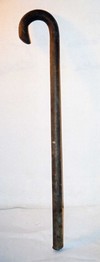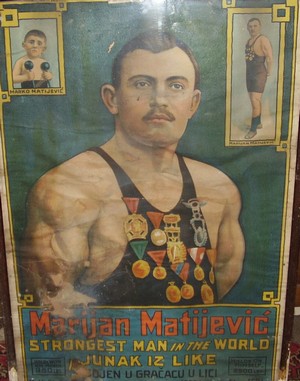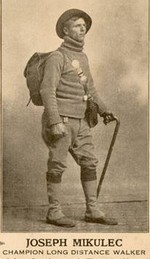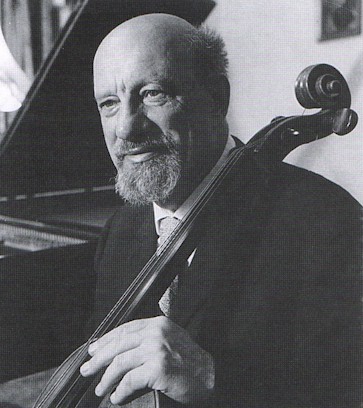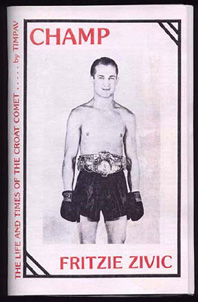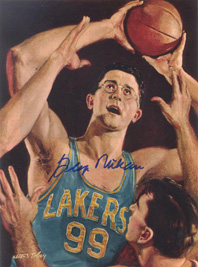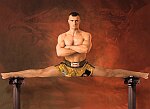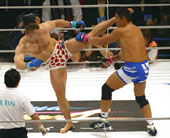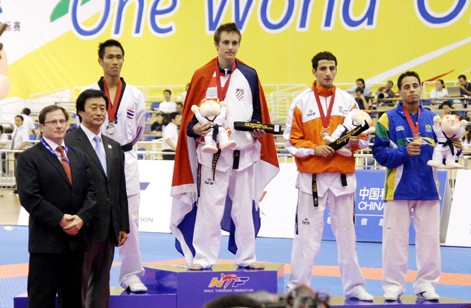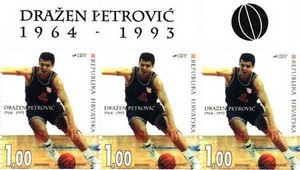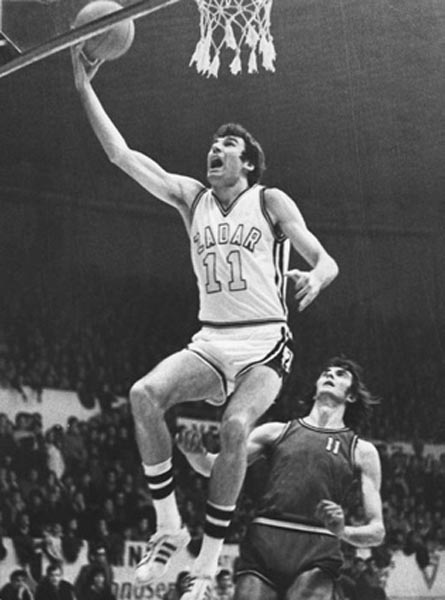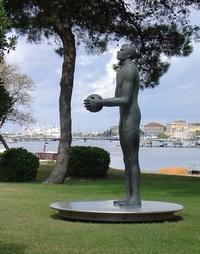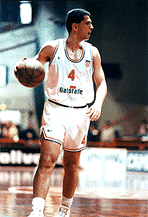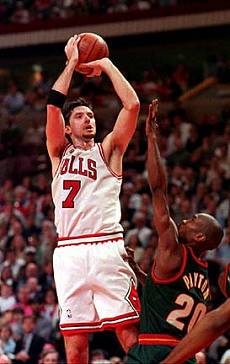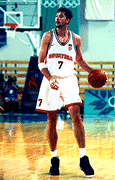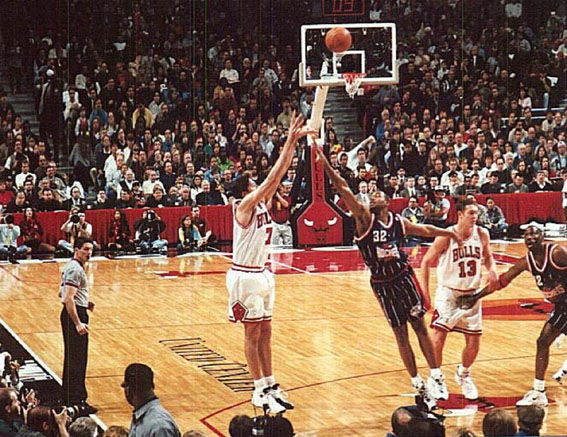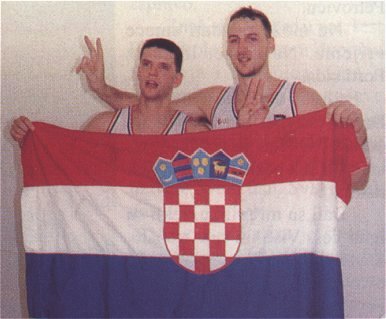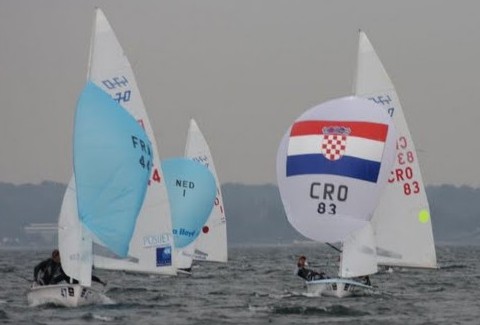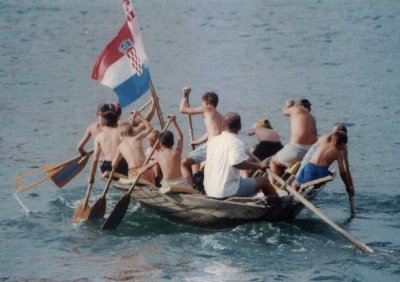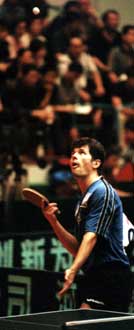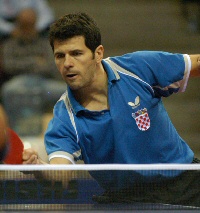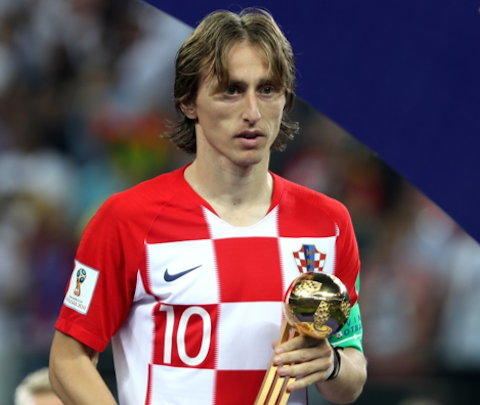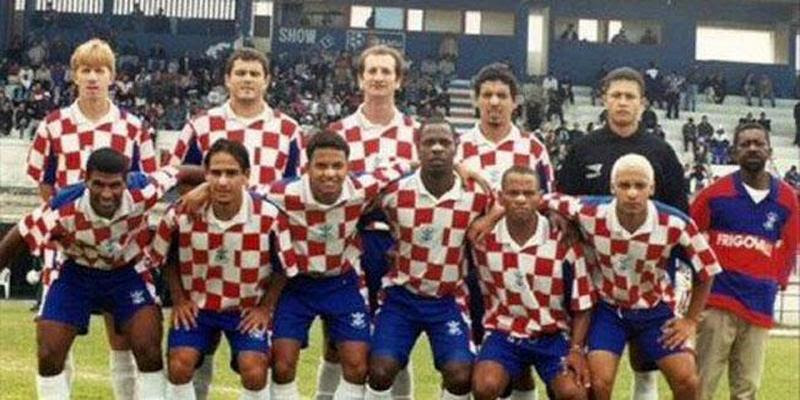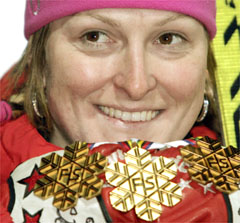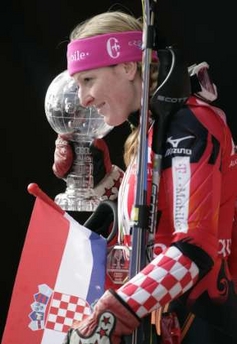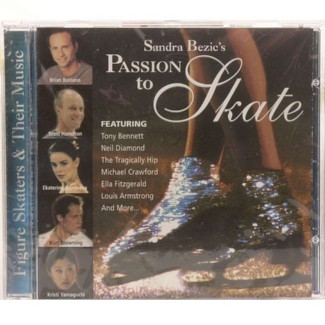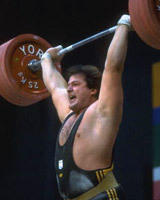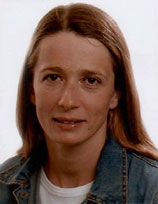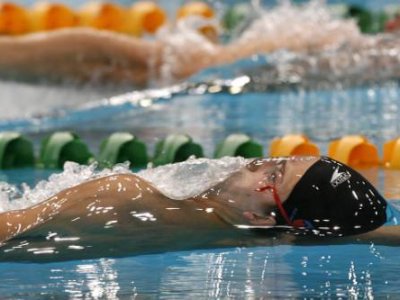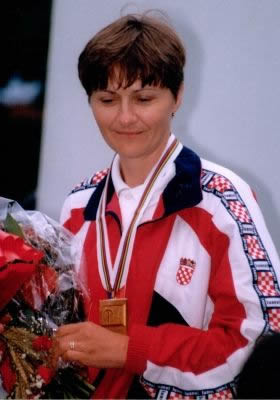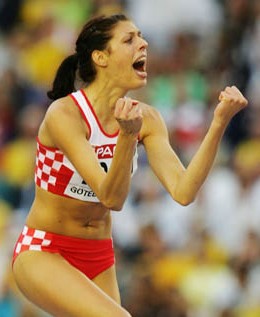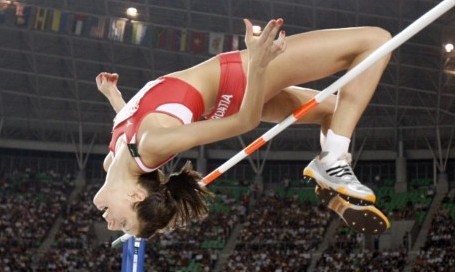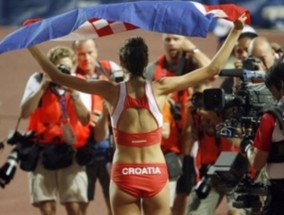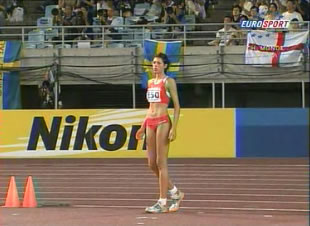Croatian Sports
© by Darko Zubrinic, Zagreb (1995)The earliest known description of a sporting event in Croatia is from the 16th century. It reffered to the 1593 regatta of seventy four (yes, 74) wooden fishing boats called falkusa, from the harbour of the town of Komiza on the island of Vis to the islet of Palagruza. It was the oldest known boat race in Europe. Falkusa is autochthonous Croatian boat of 9m of length, with the mast of equal size, in use from 11th or 12th century until the middle of the 20th century. A crew was composed of five rowers, and the marathon covered 42 miles, for which about five to fifteen hours of continuous and exhausting rowing was necessary, depending on weather conditions.
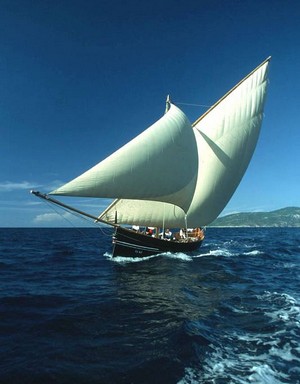
Falkusa, autochthonous Croatian boat from the town of Komiza, island of Vis
The very start of the marathon of the armada was announced by a cannon from the Renaissance tower in the Komiza harbour early in the morning of 20th May. One can imagine the foam raised by 74 boats and 370 rows in the harbour! The description of this interesting event is kept in the Liber Comissiae in the parish of the town of Vis on the island of Vis. In 1998 falkusa was included into the UNESCO World Heritage List. See Prvi zapis o Palagurskoj regati (in Croatian), Gajeta Falkusa, Vis (in Polish), The Falkusa.
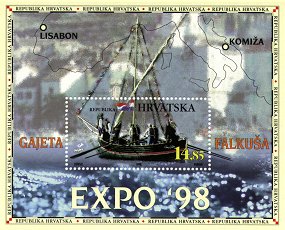
A Croatian falkusa sailed from
Komiza to
Lisabon to be exhibited at EXPO'98, where Croatia was the greatest
surprise. Postage stamp designed by Danijel Popovic, Zagreb.
Lit. Joško Božanić: Jadranski halieutikon / Gajeta falkuša – naslijeđe za budućnost, AGM, Zagreb 2017. (English edition in prepration)
The next earliest known description of a sporting event in Croatia is from the 18th century (1764). It referred to the regatta of two fishing boats representing the cities of Split and Makarska, from an islet near Milna on the island of Brac to the Split harbour. It was the Makarska boat that triumphed!
One of truly fascinating exploits in which Croatian mariners participated is related to ARCTIC EXPEDITION in 1872-1874, organized by the then Austrian-Hungarian Empire. The Croats at that time had the status of Kingdom within the Empire.

Augustin Jaromir Löffler (1832-1915), born in Czechia, the author of the first
gymnastics textbook in Croatia, published in Zagreb in 1879.
The first gymnastics textbook in Croatian language was published in Zagreb, 1879, by Augustin Löffler (entitled Gimnastika za učitelje pučkih učiona i učiteljske pripravnike, 154 pp). Born in Czechia in 1832 (in Jindřichův Hradec), he arrived to Rakovac (now a part of the city of Karlovac) in 1870. He was one of the teachers of Nikola Tesla during his schooling in Croatia, at the Higher Real School in Rakovac (now Gymnasium in Karlovac). For more information about Augustin Löffler, see Ivica Vuković i Anđa Valent: Autori matematičkih rasprava u izvješćima rakovačke realke, Prirodoslovlje 2016, str. 89-110.

Augustin Löffler: Gimnastika za učitelje pučkih učiona i
učiteljske pripravnike, Zagreb 1879
The first gymnastics textbook in Croatian language.

In 1898, at the age of 27, Croatian explorer Mirko Seljan walked 2800 km from St. Petersburg (Russia) to Paris (France), in just 110 days. In this way, he earned the title Champion Globetrotter. However, the greatest Croatian globetrotter (and probably of entire History) was Josip (Joe, Joseph) Mikulec.
The first international football (soccer) match where Croatia participated with its national name had been held in 1907 (with Czechia). The Croatian Sporting Union was founded in Zagreb in 1909. In 1911 the Croatian representation participated under its flag (and with its national name) on the European championship in Torino. In 1912 Franjo Gregl was the European champion in bicycling.
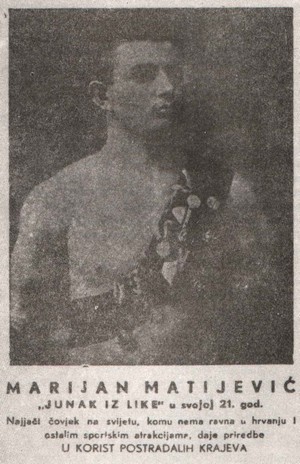
Marijan
Matijevic in 1899, at the age of 21.
Many thanks to Andreja Malovoz, Zupanja, for her kind help.
Outstanding Croatian wrestler ("Junak iz Like" - Hero from Lika) was Marijan Matijevic (1878-1951). Matijevic traveled throughout the world to exhibit his extraordinary physical power (bending metal rods, stone breaking), including China and Japan. He is known to have surpassed Primo Carnera from Italy. Buried in the town of Zupanja near Danube. He is known for his numerous humanitarian public performances. Matijevic was enormously popular, which can be seen from thousands of articles published throughout the world in English, German, French, Italian, Spanish, Arabian, Turkish, Chinese, Japanese and other languages. Once in the USA, when he was once introduced as an "Austrian athlete", he hastened to correct the announcer: "Dear gentlemen, I am not Austrian, I am Croatian born in proud Lika...".
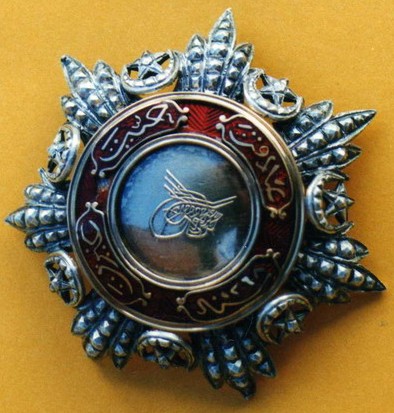
Among plenty of his decorations and medals let us mention that the last Turkish sultan Abdul Hamid V decorated him in person in Ankara with the medal of the Great Turkish Star in 1904 (on the above photo, source lickisamson.blog.hr), as the winner of the World championship in wrestling in Constantinople.
|
Marijan Matijevic's famous walking stick made of steel, weighing 12.5 kg, kept in the City Museum of Vinkovci. |
An announcement: Marijan Matijevic: Strongest man in the world, Junak iz Like (hero from Lika), holds with his mouth 950 lbs, holds on himself 2500 lbs,... Source lickisamson.blog.hr. |
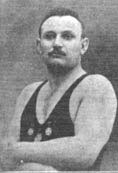
Marijan Matijević met Nikola
Tesla in New
York in 1921, and on that occasion he
financially supported Tesla's experiments. Both
Tesla
and Matijević originate
from the same part of Croatia, called Lika,
north of the mountain of Velebit.
Reference
Stjepan Tomić: S Herkulom zlatna srca / Marijan Matijević - "Junak iz Like", Hrvatski crveni križ, Vinkovci 2003. ISBN 953-99195-0-9 (many thanks to Mrs. Katarina Filipović, Županja, for information about this book)
In 1880 local Croatian young men began to play football in Županja, a small Croatian town near Danube river. Since there were only nine of the Englishmen who came to Croatia several years before, they invited local boys to join them. In 1914, professional coaches from England came to Croatia. James Donelly and Arthur Gaskhell, who were the coaches in "Gradjanski" club in Zagreb that in 1936 defeated famous Liverpool with the result of 5:1, are certainly worth mentioning.
The oldest Croatian soccer club is Bačka, founded in Subotica in Bačka in 1901, playing in the then Croatian league. It is also the oldest soccer club in this part of Europe.
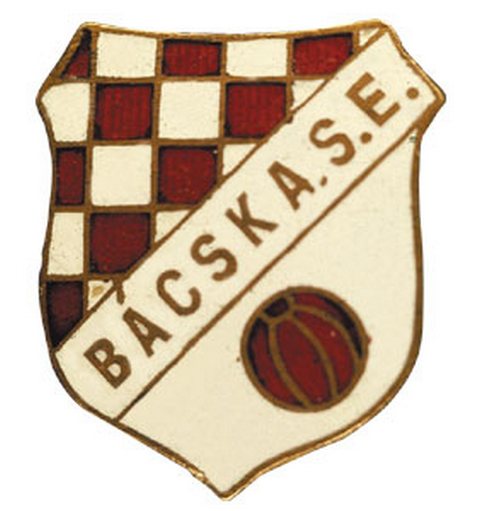
Bacska, i.e., Bačka football club in
Subotica, founded in 1901.
As we can see, it was decorated by Croatian
Coat of Arms.
This photo is appearing on the
cover page of [Dražen
Prčić] and on nogomet.lzmk.hr.
Nikola
Matkovic (1864-1946),
living in Subotica, was a very successful athlete in the then
Austria-Hungary. When the Subotica Gymnastic Society (Suboticko
gimnasticko drustvo) competed in Belgrade in 1900, they won the first
prizes in all disciplines. Furthermore, the newspapers reported that
"...the Subotica sportsmen demonstrated in Belgrade the new game called
Football, until then unknown in that city..." One of Matkovic's pupils
was Djuro Stantic,
the world
champion in walking on 75 km,
in Berlin
1905.
See Ante Zomborovic: Nikola
Matkovic prvi Hrvat-Bunjevac skolovani ucitelj tjelesnog odgoja,
Suboticka Danica (nova), Kalendar za 2004, Subotica 2003, pp 192-194.
Beginnings of soccer in Croatia
by Croatian Football Federation.
The Documentary film "Toronto Croatia - Great Croatian Story...", from Screenwriter Hrvoje Hitrec, Director Jakov Sedlar and Producer Josip Pavicic captures and for the first time presents the great and unrepeatable Historical documentation. All important witnesses of these Historical accomplishments of Eusebio, Grnja, Bradvic, Bilic, Kenfelja, Ante Pavlovic, Simunic, Suker, Niko Kovac as well as Robert Iarusci, Bruce Thomas and Ante Pavelic testify to this unified and unique team. In 1976 Toronto Croatia won the Continental Championship with as many as 20 consecutive wins and became the champion of the North American League.
Picture in possession of Dr. Ante Cuvalo, Chicago
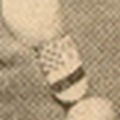
A detail on his breast: Croatian
Coat of Arms
Croatian adventurer Josip (Joseph) Mikulec set out to circumnavigate the globe on foot in the span of five years. With the start of this journey he became a perpetual wanderer. Mostly hiking, he traveled the world some 28 years and achieved a degree of fame for having collected more than 30,000 autographs of world-famous people. He was also called hyperpedestrian.
Another Croatian hyperpedestrian was Mate
Šimunović (visiting about 70 countries), about who a very interesting
monograph was published (in Croatian):
- Stipe Božić i Drago Glamuzina (eds.): Mate Šimunović Ja, Mate Svjetski (Summary),
Zagreb 2013. Video
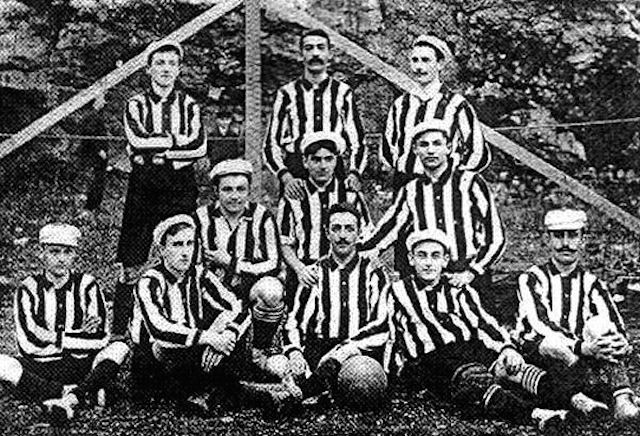
Young Fiorello
La Guardia (1882-1947) played soccer in the city of Rijeka (Fiume)
in 1905,
then at the age of 23,
here in the middle of the second line. The soccer club was a part of
the Club Atletico Fiumano,
and La Guardia served as American consul in Rijeka in 1904-1906. He was
the greatest mayor in the history of New York.

LaGuardia Airport in New
York is named after him. Fiorello La Guardia learned Croatian language
in these years.
When Nikola Tesla,
distinguished Croatian inventor, died in 1943, he read a nice
euology via radio
as a Mayor of the city of New York. Source of the photo: www.formula1-dictionary.net/rijeka_povijest_1900-1925.html
Jimmy Lyggett (1897-1955) was an
American boxer and trainer of Croatian boxing clubs in Zagreb, as well
as of Croatian boxing national team from 1939 to 1945. At the age of
20, he won the United States Championship for professional Black
boxers, while the next year he won the Colored Championship of the
World (light heavyweight). While he lived in Vienna, Austria, he met a
woman of Croat
descent, Roza, whom he married. The couple moved to Zagreb, Croatia in
the early 1930s. There, he opened his boxing school in Ilica street. At
the age of 33, he ended his career as boxer. He trained many young
boxers in several boxing clubs in Zagreb, starting with boxing club
Croatia, and later with clubs Herkules, Makabi and Radnik. After a
while, he became a friend with a neighboring tavern owner. He gave him
his warehouse in Preradovićeva as a training hall.
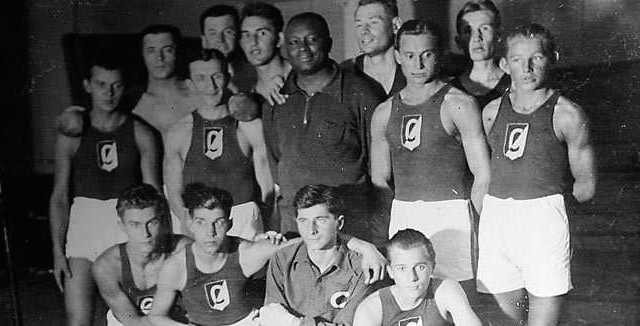
Jimmy Lyggett as a trainer of Croatian boxers in Zagreb. Source of the photo.
When the Independent State of
Croatia was formed, its Minister of Sports, Miško Zebić talked Lyggett
into training the Croatian national boxing team. He prepared the
Croatian team for the cancelled 1940 Olympics. Despite his race,
Lyggett was not interfered with by the Axis allied government of
Croatia.
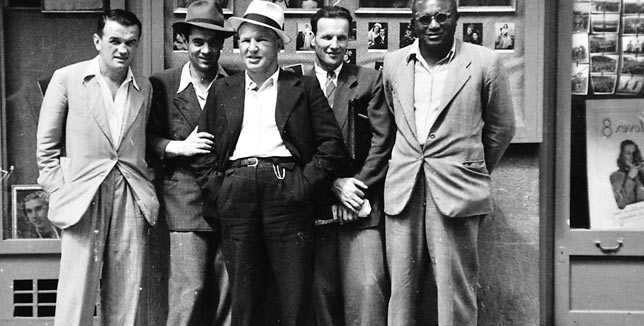
Jimmy Lyggett on the right and Mijo Drvarić in the middle, champion of Croatia
and ex Yu (in 1940).
Lyggett was an anti-Communist.
Before the end of the war, his
brother invited him to return to the US. Finally he accepted the
invitation and convinced his wife to move to the US. In 1945, they set
off for the US via Italy. They waited for months the ship that would
take them to United States. His wife got ill and died in Milan. Broken,
Lyggett returned to America alone. His death place and death date are
unclear. Some sources say that he died in US in 1955. In Croatia, among
his friends he had a nickname "glista" (worm). Source of this text and
more
information at Wikipedia (and in
Croatian). A film about Jimmy Lyggetty has been shot by Oktavijan Miletić. See 2 min. video about Lyggett in Croatia. Many thanks
to Mr Tomislav Nürnberger, Zagreb, for his
kind information about Jimmy Lyggett.
Rudolph Matz (1901-1988), a famous cello player and music educator, professor at the University of Zagreb, was a top Croatian sportsman. As a sprinter he won the first place in the Prague in 1921, beating also German sprinters. He was a record holder in Croatia on 100 (for 11 years!), 200, 4x100, and 400 m. He stressed that the work of a music educator is similar to that of a trainer.
Lit. Zrinka Jelčić: Veliki opus vedrine / Rudolf Matz, Muzej Grada Zagreba, Zagreb 2017.
 Franjo
Mihalic (1921) started his
active sporting
career in the period of the Independent State of Croatia
(1941-1945), and after 1945 had to move to Belgrade, together with many
other best Croatian sportsmen. He won a silver
medal in Marathon at the Olympic Games in Melbourne (1956);
he was the winner
of the International races in
Sao Paulo (1952,
1954), as well as Marathon
races in Tokyo, Moscow,
Boston, Athens, Cross de
Nations in Paris (1950-1961).
Franjo
Mihalic (1921) started his
active sporting
career in the period of the Independent State of Croatia
(1941-1945), and after 1945 had to move to Belgrade, together with many
other best Croatian sportsmen. He won a silver
medal in Marathon at the Olympic Games in Melbourne (1956);
he was the winner
of the International races in
Sao Paulo (1952,
1954), as well as Marathon
races in Tokyo, Moscow,
Boston, Athens, Cross de
Nations in Paris (1950-1961).
We should remember also Fritzie Zivic (originally Zivchich, 1913-1984), known as The Croat Comet, famous welterweight boxer in the USA, who had 230 professional matches. In 1940 he won the title of the champion of the world having defeated "unbeatable" Henry Armstrong. Their rematch held in Madison Square Garden in 1941, where Fritzie managed to defend his title, was visited by 23,190 people (and 5,000 fans were reportedly denied access). This remains all-time highest Garden record for attendance. In 1993 entered the "International Boxing Hall of Fame". For additional information see the Vladimir Novak web page.
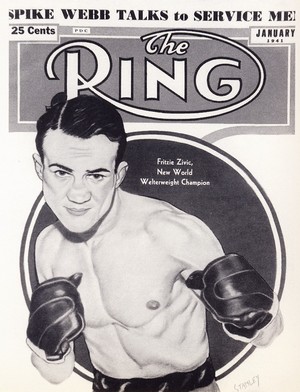
Fritzie Zivic, New World
Welterweight
Champion, The Ring, January 1941,
source Vladimir
Novak
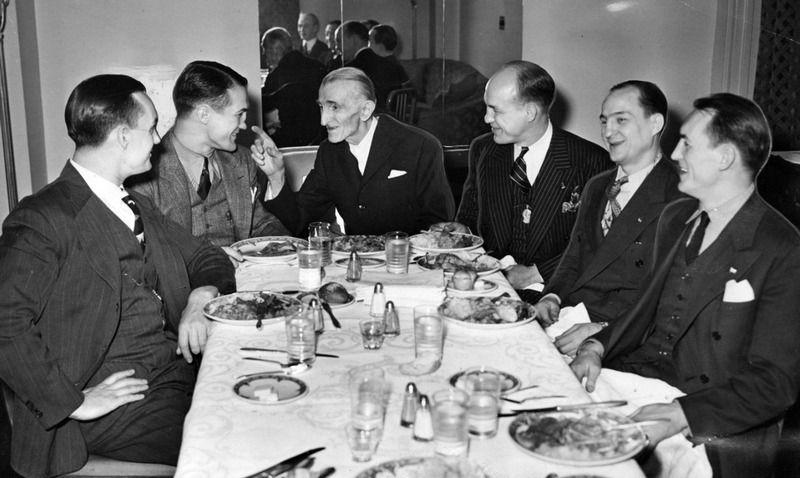 In
1941 Nikola Tesla,
distinugished Croatian-American inventor, invited Fritzie Zivic to the
lunch in New York,
In
1941 Nikola Tesla,
distinugished Croatian-American inventor, invited Fritzie Zivic to the
lunch in New York, as well as his brothers, after one of his successful defences of the title of the welter-weight world champion.
Source newsinteractive.post-gazette.com, from the photo archives of the Pittsuburgh Post-Gazette.
From left to right: Joe Zivic, Fritzie Zivic, Nikola Tesla, Jack Zivic, Pete Zivic i Eddie Zivic.
Their father, Josip Živčić, was born in Bosiljevo in Croatia.
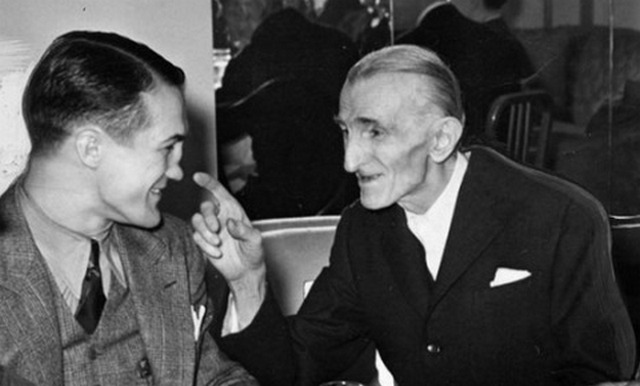
The Croat Comet Fritzie Zivic (originally Živčić) and Nikola Tesla
Fritzie Zivic was inducted to the International Boxing Hall of Fame in 1993.
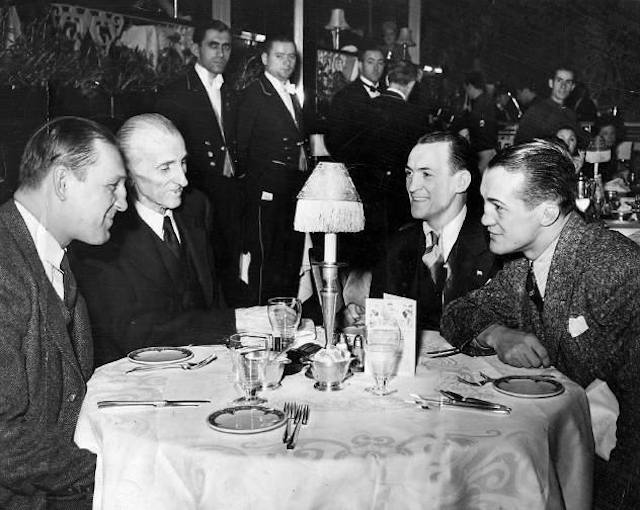
Nikola Tesla (2nd from the left) with three of the Zivic brothers: Eddie, Pete and Fritzi (on the right). Source.
Several books were written about his life (below is the front page of one of them, Timpav: CHAMP - Fritzie Zivcic - The life and time of the Croat Comet. His four brothers were all boxers, and two of them, Pete and Jack Zivic, represented the USA at the 1920 Olympic Games at Antwerpen, Belgium. Jack won the Gold medal for the USA in featherweight category.
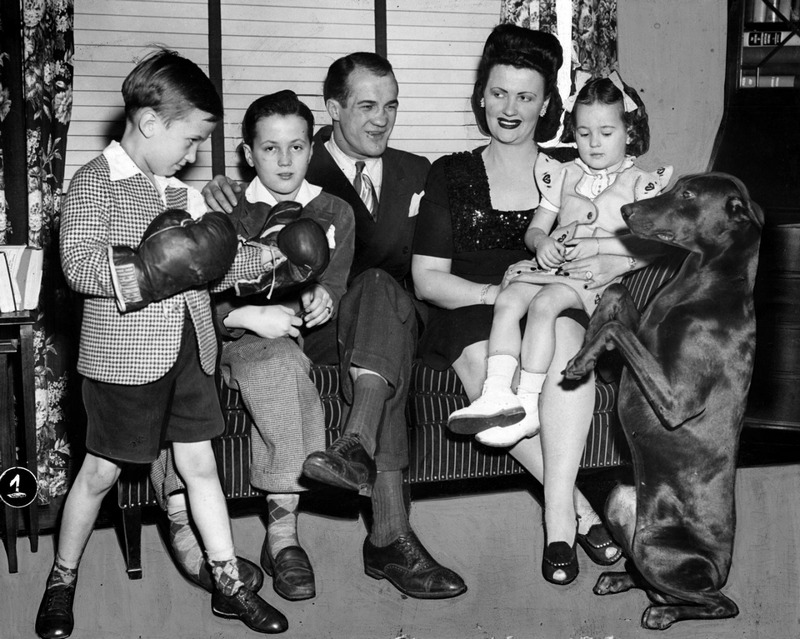
Fritzie Zivich, the Croat Comet, with his family in 1946.
Sandy Cecere, 2005: We have fond memories of George Mikan in my family. He was a towering man with a big heart, and a faith in God that carried him through many rough times. He needed a special car so that he could fit into it. When he came to visit at our house he had to duck to get into our house, and into our car, and garage. My father, a dear friend of George was 5'8 inches tall, and George was 6'7" tall. When the two stood next to one another, they were the true mutt and Jeff. George was a man of great faith, and I know that Sam and George are in heaven practicing law together, and talking about their love of sports. I will always remember George Mikans smile and what a great friend he was to my dad. When my dad was dying, Dad didn't want to see anyone, but George didn't care, he came into the hospital to see his friend Sam, and I remember my father's eyes lighting up, and that my Dad felt good enough that day to have a long conversation with his friend George. In my family we were taught to always call our elders, Mr and Mrs., so I did. When I was in my 30's George told me to call him George. I told him I just didn't think I could do that. He laughed and made me!! His nickname for me was "the favorite one". I will always remember him.
Perica Vlasic (1932-2004), a famous Croatian rower, was european champion in skiff in 1953 in Copenhagen. He could row for an unbelievable 58 strokes per minute. This brought him also the world title in skiff at the famous Henley Royal Regatta in London in 1954, and he was presented the gold cup by the English Queen in person, the patron of the regatta. It is funny that, to the amazement of other sportsmen, Vlasic came to the London town just a day before the competition, without his trainer, and without any boat. The boat was lended to him by an English trainer - God bless him.
The following few interesting lines are based on Sports in Zagreb:
- The famed scientist (biologist) and table tennis player, Professor Zarko Dolinar (1920-2003), who captured eight gold medals at world championship competitions. Dr. Dolinar still holds an unusual world record. He is the only athlete in the world who was a world champion as well as a doctor of science. He was former World Doubles Champion and had a prestigious position of ITTF (International Table Tennis Federation) Sports Science Committee head. It is interesting that he taught John Lennon to play table tennis (information by Nenad Bach). In China he was invited to have dinner with president Mao Tse Tung, together with R. Nixon, president of the USA (information by Nenad Bach). Except of being university professor in Zagreb and in Basel, he also had the title of one of Croatian Righteous among the nations.
- Students of Zagreb University founded the first sports society in Zagreb called "HASK" - the Croatian Academic Sports Club, already in 1903. It is little known that our eminent chemist and recipient of the Nobel Price for chemistry in 1975, Vladimir Prelog, was a "HASK" athlete and the first Croatian champion in the modern pentathlon in 1923!
On the background of this web-page is Nenad Bach's song Can We Go Higher?, or We Will Win (on a Wild World Web), accompanied by the sound of Croatian tamburitza (Blue Adriatic - Plavi Jadran, from San Francisco).
Famous Croatian baseball players in the USA:
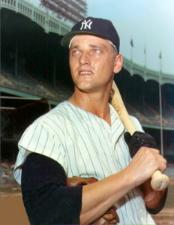
- Roger Maris (1934-1985), major league baseball player, was born in Hibbing, Minnesota the son of first generation Croatian Americans. Roger Maris (Maras) had a baseball record in the USA which was unbeaten for as long as 27 years. See Roger Maris Museum and www.croatia.org.
- Mickey Lolich
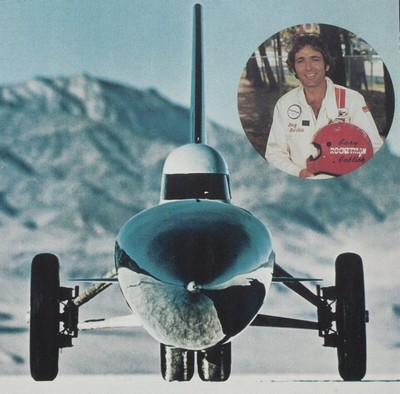
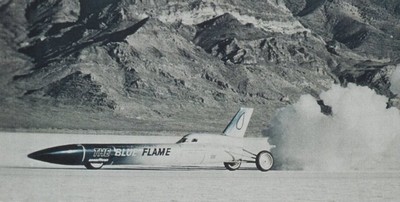
Source
Vladimir Novak: Croatians
in America
Gary Gabelich, USA Croat (his parents are from the city of Split), has won the world record with his automobile "Blue Flame" in 1970, achieving the speed of 622.4 miles/h (more than 1000 km/h). Even more interesting is that this record was unbeaten for as long as 13 years, see History for kids, Utah, USA. In 1985 the Long Beach City Council named a park in his memory, Gabelich Park (near San Pedro and Los Angeles).
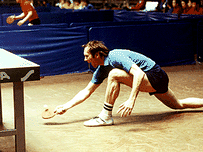
Among the most outstanding Croatian sportsmen was Dragutin Surbek (table tennis), who had won hundreds of tournaments, from Tokyo and Beijing to Zagreb (37 medals from european and world championships!). In China he is known under the nickname Surbeka, treated as table tennis God there, and in Croatia as Surba.
History of Croatian Table tennis (in Croatian).

Mate Parlov, Olympic boxing champion in Munich in 1972
A light heavy-weight boxer Mate Parlov (1948-2008) was was Olympic champion in Munich, Germany, in 1972, inaugural World champion in 1974 in Havana, Cuba, twice European champion (1971 and 1973). In 1974 he started his professional boxing career. and professional semi heavy-weight professional European champion in 1976, and professional World champion (WBC) in 1978. In his amateur career he had 310 matches with 13 defeats, while in 29 professional matches he had only 3 defeats.
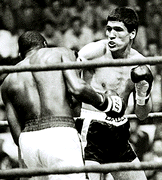
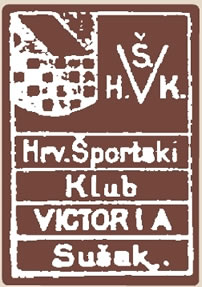
The oldest Croatian swimming club Victoria was founded in 1908 in the
city of Rijeka
(more precisely, in Sušak). It served to high school students.
Veljko Rogosic was named International Long Distance Swimming Federation World Champion four times between 1971 and 1974. He was the first one to have swam the distance of 200 km without interruption. From the town of Grado near Trieste in Italy to Riccone near Ancona he set the world record of 225 km in long distance swimming (during this swim he lost 16 kg).
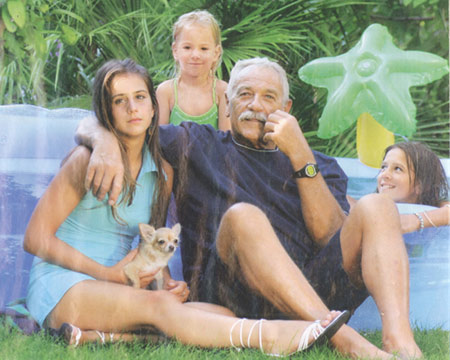
In 1992 this outstanding sportsman entered the International Marathon Swimming Hall of Fame, Florida, USA. He was participant of the Homeland War during Greater-Serbian aggression on Croatia and one of the founders of Croatian Marine Corps. Recipient of the Medal of Homeland War from president Franjo Tudjman. His motto and message to young people is
- Rogosic swam La Manche (45 km) in 2004 at the age of 63! For this he needed 11 hours and 27 minutes. His name was written in the 'Gold book of La Manche' as the first Croatian and the oldest man to do so.
- In the summer 2005 he swam almost 1,000 km along Croatian coast (from Savudrija to Rt Ostro in Konavle) in less than two months, at the age of 64! Also, this is the ultra-marathon swimming world record (880 km in 222 hours, in 57 etapes in less than 58 days).
- In 2008 Rogosic swam 171 km marathon from Sicilia to Africa, and reached Africa's Cape Bon in Tunisia. He started the first marathon from Europe to Africa on his 67th birthday!
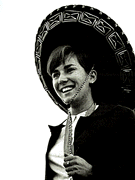
Djurdjica Bjedov won the Olympic gold medal in 100 m brestroke swimming during the 1968 Summer Olympics in Mexico City, breaking the then Olympic record. She was the first Croatian sportswoman to win an Olympic medal. At the same olympiade Djurdjica also won silver medal in 200 m breaststroke.
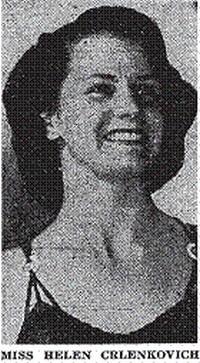 |
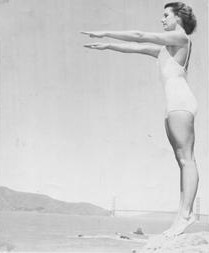 |
Helen Crlenkovich (1921-1955) was one of the most successful athletes in America and the world on the three-meter springboard and the ten-meter platform. She was an American-born Croatian lovingly known as "Klinky." Her best sports years began in the late 1930's. She not only became the best American, but also the world springboard and platform diving champion. She was the first female to do a full-twisting 1 1/2 somersault and several other dives that were heretofore only achieved by men. Helen was chosen to represent America in the 1940 Olympic Games. All concerned felt that Helen would achieve two gold medals as a minimum. However, because of the onset of the Second World War, the games were cancelled. She was also honored by being inducted into the Helms Foundation Diving Hall of Fame in California. In September 2008, Helen received post-mortem recognition by the World Acrobatic Congress held in Las Vegas for her life achievements in swimming and diving. She died very young out of cancer. Her both parents are from Croatia: mother Anka Tomin is from Petrijevci, and father Adam from Banicevac. (Text by dr. Ante Chuvalo, Chicago).
An interesting note as regards Helen is the fact that her trainer, Phil Patterson, insistently urged this young Croatian-American woman to change her name to something that is "more suitable." He told Helen that with a name like Crlenkovich, she will not achieve any hoped-for success. Nonetheless, Helen, just as insistently, rejected his suggestion because she was proud of her Croatian name and heritage. This fact speaks volumes as to the strength of her character.
In 1998, in the finals of the European Championship held in Sheffield, England, Milos Milosevic set the new world record in the 50 meter butterfly (23:30), thus beating the world record of the Russian swimmer Denis Pankratov, that many held unbeatable.
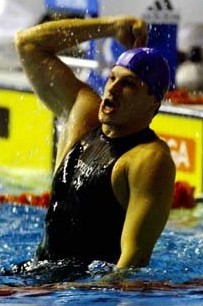
Milos Milosevic, world record on 50m butterfly in 1998
Milos is a native of Split, now living and training in Rijeka.
European champion in 2000 in backstroke swimming with 1:58.62 on 200m is Gordan Kozulj.

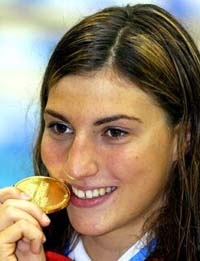
Duje Draganja won the Olympic silver medal in men's 50m freestyle final, Athens, 2004.
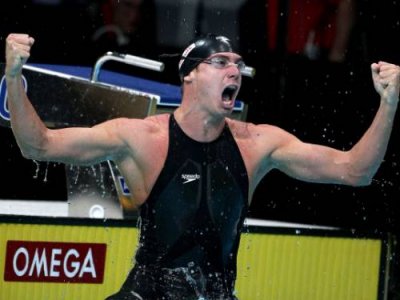
Duje Draganja breaking the world record in 2008 in Manchester. Source: CROWN.
In 2008 Duje Draganja broke the men's 50 metres freestyle world record at the finals of the World Short Course Swimming Championships in Manchester, UK. This was one of the greatest successes in the history of Croatian sport.
Sanja Jovanovic from the city of Dubrovnik, broke the world record in 50 meters backstroke on European Short Course Swimming Championships in Hungary, 2007. This was one of the greatest achievements in the history of Croatian sport.
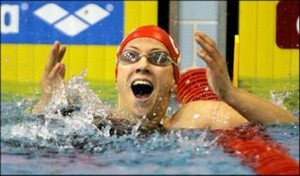
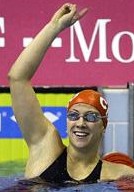
Sanja Jovanovic, world champion in 50 m backstroke, 2007, AP Image
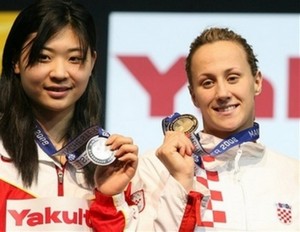
Sanja Jovanovic with gold medal, breaking her own world record, and China's Gao Chang, silver, during the medal ceremony for the final of the Women's 50m backstroke at the World Short Course Swimming Championships at the MEN Arena in Manchester, England, 2008. (AP Photo/Paul Thomas)
Sanja Jovanovic broke her own world record on 50m backstroke swimming at the 2008 World Swimming Championships Manchester, UK. Her new world record time is 26.37.
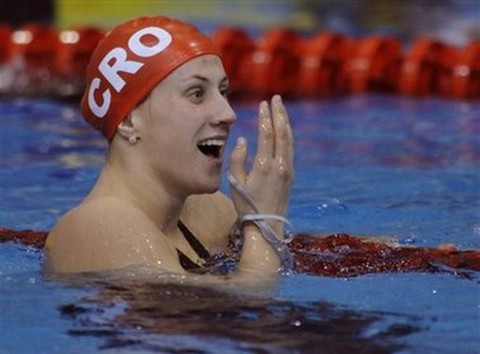
She again won her new gold medal at the European Swimming Championship held in Istanbul, capital of Turkey, 2009. And not only this, she broke the world record on 50 m backstroke, and her new world record is 25.70. This was her fourth world record in swimming at international competitions.
Tina Mihelić won the title of the 2013 world champion in sailing in the category of Radial Laser. This is for the first time in history that a Croatian sportswoman won such a title. The competition took place in China.
Dina Levačić, marathon swimmer, was he first
Croatian woman to have swum across La Manche (or in English: English
Channel), 2019
Ivo Prebeg, a professional heavy-weight boxer, was the European champion in 1969. Marijan Benes was a professional European boxing champion in 1979 (welter-weight category).
Another well known name is George Chuvalo (Jure Cuvalo), Canadian Croat, heavy-weight champion of Canada for more than two decades (from 1958 to 1979), for as many as seventeen years among the Top Ten professional boxers in the world, and never knockouted. He had matches among others with Floyd Patterson, Mohammad Ali (twice, both times for the title of the world champion), Joe Frazier, and George Foreman. His professional record is impressive: 79 wins (70 by knockouts), 15 loses, and 2 draws.
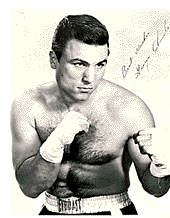
Except being a world class boxer, Chuvalo is known in Canada and in the USA as Anti-Drug Crusader. This engagement came as a result of a personal tragedy: he lost his two sons due to drug overdose, the third one committed suicide, and his wife committed suicide after that. Having remarried, he now tours Canada and the USA, accompanied with his remaining son Steven, giving lectures for pupils, students and parents, and trying to warn people about the danger of drugs. He visited more than 300 schools, appeared in numerous movies, tv shows, and is recipient of "Order of Canada" from Canadian government for his hard work and dedication to Canada's youth. Please, do not miss to visit
FIGHT AGAINST DRUGS
www.fightagainstdrugs.ca
The above exceptionally humanist and deeply moving web site obtained the Golden Web Award for 2001 by the International Association of Web Masters & Designers. In 2009 George Chuvalo visited the town of Ljubuski in Bosnia and Herzegovina, where his parents Stipe and Kate were born, and delivered an antidrug lecture for youngsters.
Zeljko Mavrovic won the title of European heavy-weight boxing champion in 1995 (he also had a match with Lennox Louis). The European karate champion in absolute category in 1995 was Enver Idrizi (of Albanian nationality), also ex-champion of the world (1994). A world-wide reputation in thai boxing had Branko Cikatic from Split, winner of many international tournaments, including the grand 1994 K-1 Tokyo tournament (see an interesting Brazilian video about him). Also very successful in martial arts is Stefan Leko.
Filip Hrgovic became super
heavyweight boxing champion of Europe in 2015. He was the Junior boxing heavyweight champion of the
world in 2010.
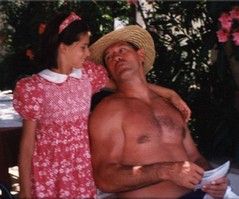
![]()
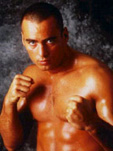
Several outstanding results in karate had Junior Lefevre, a Belgian born Flemish, who fought under the Croatian flag. He won three european gold medals and one world's gold (world champion in München, Germany in 2000, in the category to 70 kg).
Great successes in martial arts has Mirko Filipovic, known as Mirko Cro Cop: K-1 Grand Prix '99 Finalist, I.K.B.F World Heavyweight Full Contact Champion, K-1 WORLD GP 2000 in Fukuoka Second Champion, winner of the 2006 PRIDE competition in Tokyo.
In 2003 Stipe Drvis (Drews) won the title of European semi-weight boxing champion. In 2007 he became the light heavyweight WBA champion of the world.
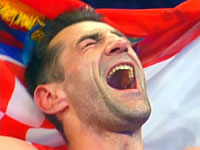
Stipe Miocic became the UFC World Heavyweight Champion in
2016.
In wrestling there is the widespread term of
cravate, cravat, kravat, kravata
for headlock move (in French, English, Italian, Turkish, Croatian, Polish, and other languages). This term, used also for necktie, has been derived from the Croatian name.
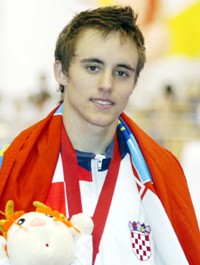
Filip Grgic won gold medal at the 2007 Bejing WTF World Taekwondo Championships in male bantamweight (under 62 kg) category, China. Photo from www.wtf.org.
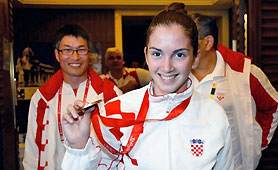
![]()
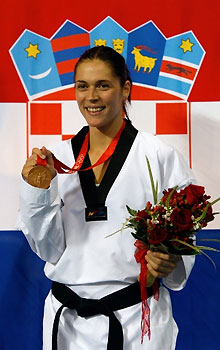
Martina Zubcic (feather category, under 57 kg, on the left) and Sandra Saric (under 67 kg) won bronze medals in taekwondo at the 2008 Bejing Olympic Games.
Matea Jelic of Croatia won taekwondo gold medal at the 2021 Olymic
Games in Tokyo. This was the first gold medal in this sport for Croatia.
Brigita
Matić won gold medal
at the European Championship in Judo in 2012. And now, her sister
Barbara:

Barbara Matić won gold medal in judo
(under 70 kg) at the
Olympic Games in Paris in 2024.
Source of the photo: International Judo Federation (IJF).

Source of the photo: IJF. Meet the champion: Barbara
Matić
Stevan Horvat was distinguished Croatian wrestler, twice the world champion in the category up to 55 kg: in 1963 in Helsingborg, Sweden, and in 1966 in Toledo, USA. Subsequently he was instructor and coach of national wrestling teams of Japan, USA, Guatemala, Honduras, Slavador and the Netherlands. More information can be seen in the Leksikon podunavskih Hrvata - Bunjevaca i Šokaca, part 9 (H), pp. 62 and 63. In 2012 a bust was unveiled in his honour at the University of Novi Sad. The meaning of his second name, Horvat, is just - Croat.
Edward "Moose" Cholak became a wrestling star at Chicago Vocational High School and went on starring for 40 years as he took part in 8,000 matches, in 1963 becoming world champion.
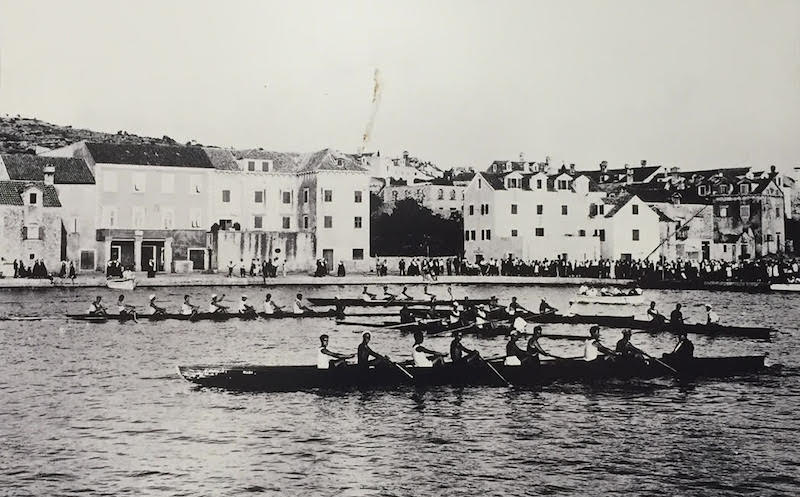
Rowing competition in the town of Zlarin on the island of Zlarin arround
1900, near the city of Šibenik on Croatian coast.
Zlarin is also known for coral hunting and production of fantastic
coral jewelry.
The nearby island of Krapanj is famous for coral
and sponge hunting.
Matija Ljubek has won a fair number of olympic medals in kayak. He is considered to be one of the greatest kayakers in the history of this sport.
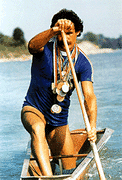
Milan Janic won gold medal in single kneeling canoe at the World Championship in Belgrade 1978, and silver medal on 1000 m. Ivan Sabjan, a younger colleague of Matija Ljubek, was the world champion in C-1 on 10,000 m in Duisburg 1987, Germany.
Nikola Primorac, Croatian captain of City of Ragusa craft sailing from Liverpool to New York and back in 1870 (also here)
Regarding collective sports basketball is very popular. Important role for its development in Croatia had Mirko Novosel, both as a basketball trainer and indefatigable organizer. He was inducted into the Basketball Hall of Fame, USA, in 2007.
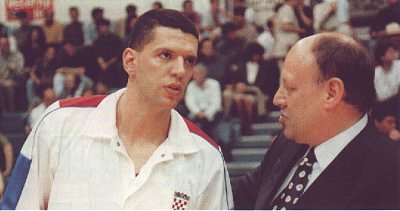
Dražen Petrović
and Mirko Novosel
Source: Croatian Philatelic Society, USA, founded by Ekrem Spahic
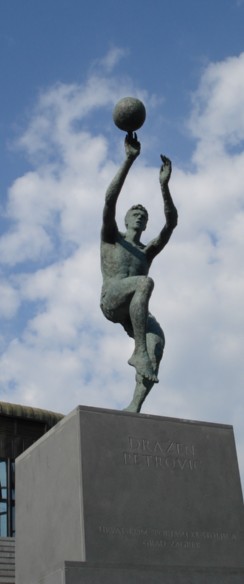
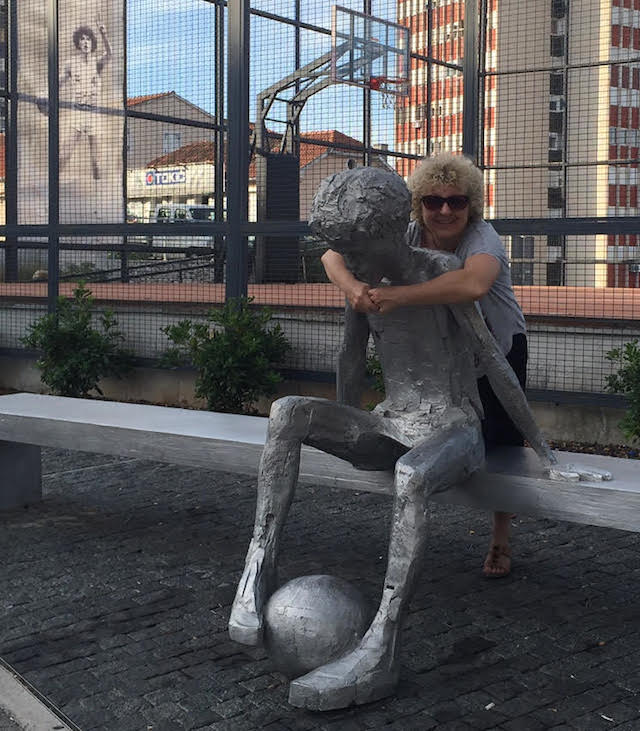
Monument to the memory of Dražen Petrović in his native city of Šibenik.
The city of Šibenik was founded in 1066 (11th century), during the
reign of Croatian King Krešimir.
The best Croatian basketball players were
- Kresimir
Cosic (1948-1995; he spent last
years of his life in the USA as
the Croatian diplomat); became
only the third international player ever elected to the world's Basketball Hall of Fame (in 1996)s
located in Springfield, Massachusetts, the
birthplace of basketball. See also his biography at KK Zadar.
- Drazen Petrovic
(you can see his beautiful monument in the Olympic park in Lausanne,
Switzerland), elected the world's Basketball
Hall of Fame
in 2002. He was very popular throughout Europe. Drazen Petrovic:
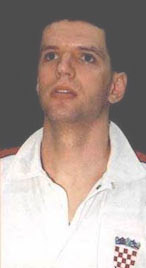

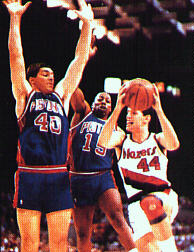
- Toni Kukoc, inducted to the FIBA Basketball Hall of Fame in 2017, and to the NBA Basketball Hall of Fame in 2021
- Dino Radja, inducted to the Naismith Basketball Hall of Fame in 2018.
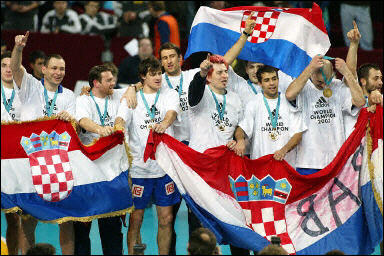
Rudy Tomjanovich, NBA player and coach of Houston
Rockets, twice NBA champion was inducted to Basketball
Hall of Fame in 2020.
Our basketball, water polo and handball teams were in some periods among the best teams in the world. They won many gold medals on the Olympic and World championships. Our water polo team won silver medal at the Olympic games in Atlanta, 1996 (gold medal for ex-YU at the Olympics in Ciudad de Mexico in 1968, the team had 12 players, out of them 8 were Croats). The Croatian handball team won
- the olympic gold medal in Atlanta in 1996, under leadership of Velimir Kljaic,
- gold medal at the World Championship held in Portugal in 2003, under the baton of Lino Cervar
- the olympic gold medal in Athens in 2004 with perfect score, without any lost game, under the leadership of Lino Cervar (for the first time in the history of this sport the same national team bears the titles of both Olympic and World champions).
- silver medal at 2020 European Handball Championship, under the
baton of Lino Cervar
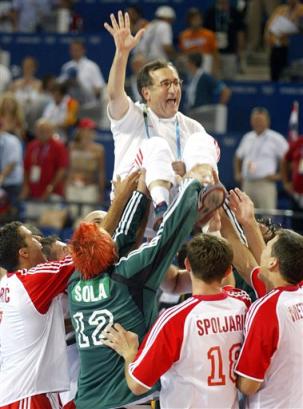
I warmly recommend You the following book
(in Croatian):
Lino Cervar: Od Ucke do Olimpa,
Teovizija, Zagreb, 2004., ISBN 953-209-084-3
La
Croatie est championne du monde de handball
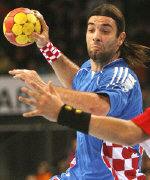
![]()
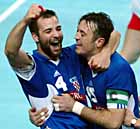
In 2004, when Croatia won the second Olympic handball title in Athens (after the first one in 1996, Atlanta), Ivano Balic was proclaimed the best handball player of the world for 2003 by International Handball Federation.
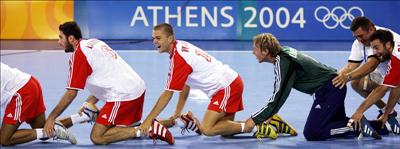
A famous "Croatian worm" - handball players celebrating gold medals (Reuters)
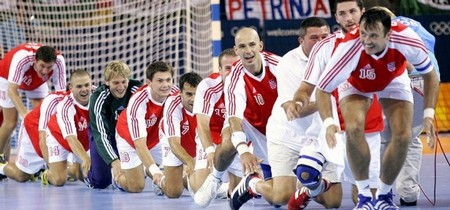
At the 2009 World Handball Championship organized in Zagreb Croatia won silver medal, which was another great success our team. World Cups History.
In 2009 Croatia became the new world champion at Men's Youth World Championship in Tunisia. In 2010 Croatia handball team won silver medal. It is interesting that in the period of 2000-2010 Croatian team was 9 times in the finals of the European championships. No other country in Europe had such a continuous series of top results.
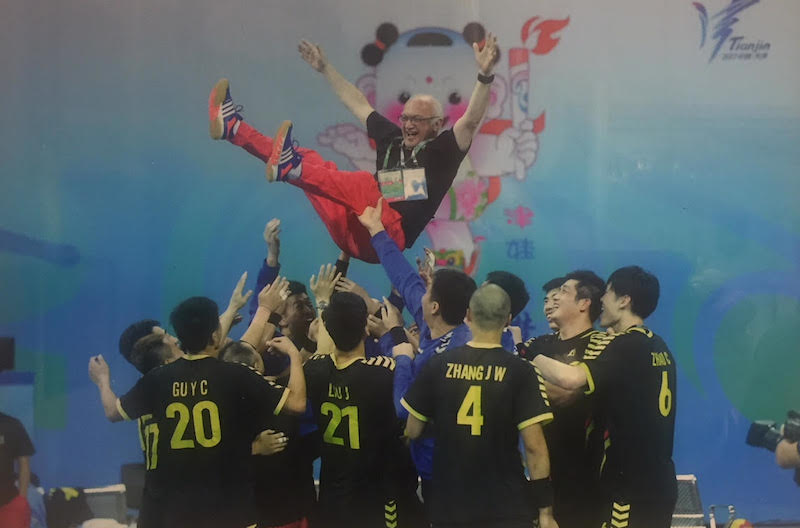
Nenad Zvonarek, handball trainer in China
Professor Nenad Zovnarek in his
office at the University of Zagreb, with Professor Mario Cifrek
Nenad Zvonarek former selector of Chinese handball representation
There is nothing extraordinary that the handball team of Cannes, France, once won a match scoring altogether 24 goals. But the following is without precedent: all the goals were scored by one single person! And that person was Ante Kostelic - Gips (nicknamed Gips = plaster; guess why!), better known as father of Weltklasse skiers Janica and Ivica.
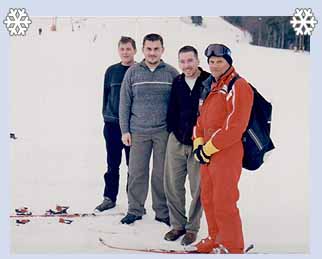
Ante Kostelic-Gips with
friends,
photo from Stanko Kempny
Croatian Mountaineering Society
During ex-Yugoslavia, although he was one of the best handball players at that time, it had not been allowed to him to enter the representation, and that is why he turned to an individual sport of skiing as a trainer. Mr. Kostelic is not only a great expert in sports, but also a person knowledgeable on the classical literature.
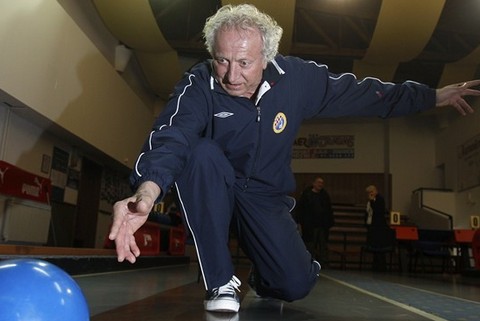
Nikola Dragaš, three times world champion in 9 pin bowling
Nikola Dragaš was three times indidvidual world champion in 9 pin bowling: in Split 1972, Eppelheim 1974 and in Vienna 1976. In 1988 he was the world champion in pairs with Boris Urbanc. He is one of the greatest bowling players in history. During the Serbian 1991-1995 aggression on Croatia he was active in humanitarian aid.
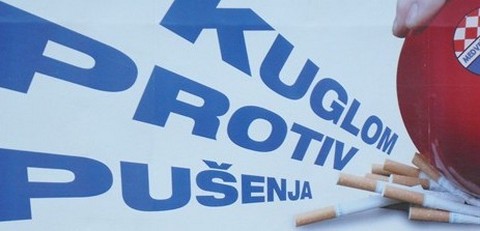
Since 2003 Nikola Dragaš leads the movement "With bowling
against smoking".
Mladost-Zagreb is the most successful water polo club in the world, with the greatest number of world's and European trophies in its hands (seven times: 1967, 1968, 1969, 1971, 1989, 1990, 1996). In 2003 Mladost was awarded the newly founded yearly prize of the AWPC (Association of Water Polo Clubs) in Budapest, Hungary, for their contribution to the world wide popularity of water polo. Players of the Mladost (= Youth) team are nicknamed zabci (froggies; zaba = frog).
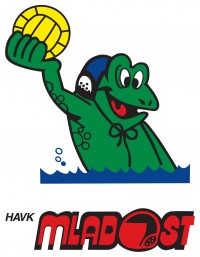
Zapci (Froggies), players of Mladost-Zagreb water polo club
Soccer is of course the
most widespread sport. An excellent soccer club in Croatia is Hajduk
(from the city of Split), founded in 1911 (by Croatian students in the
Prague, Czechia,
in the well known beerhouse "U Fleku") three times
quarter-finalist of the European League of
Champions (last time in 1995) and once a semi-finalist of the UEFA cup.
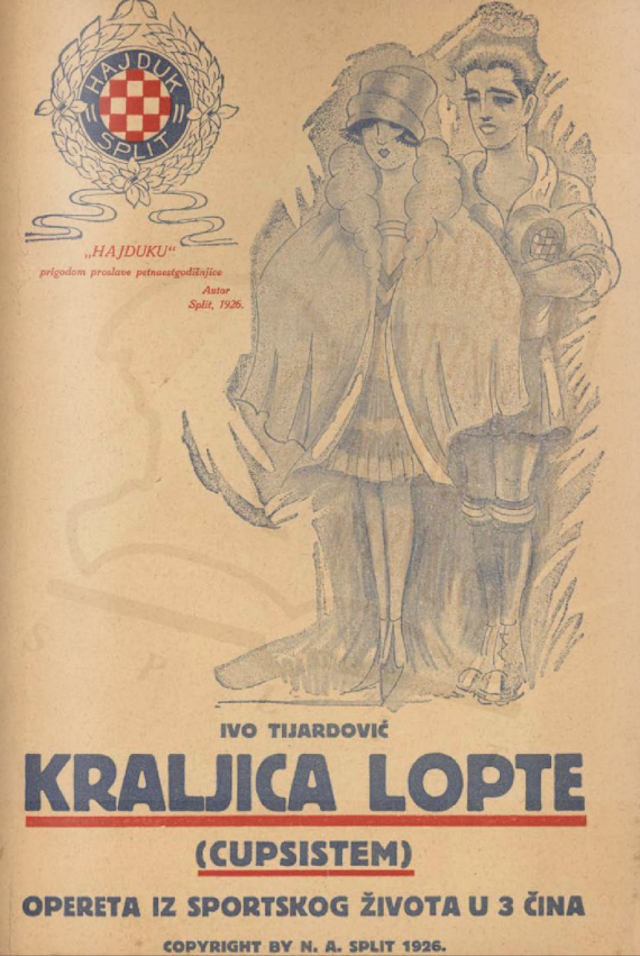
Ivo Tijardović: Kraljica lopte
(Queen of the Ball),
Split, 1926.
Hajduk is the only soccer club in the world which has its own operetta,
composed already in 1926.
Many thanks to Dr Lea Botteri, University of Zagreb, for her kind
information.
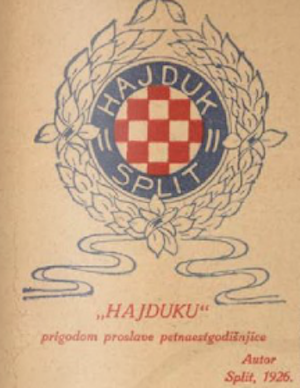
Dedication by the author, Ivo Tijardović, distinguished Croatian
composer, in Split 1926,
on the occasion of the then 15th anniversary of the soccer team of
Hajduk (founded in 1911).
Hajduk is the only soccer team in the world which has its own operetta (Kraljica lopte, i.e., Queen of the Ball), already since 1926. It has been composed by Ivo Tijardovic, distinguished Croatian composer. The champion of the Tournament of Cities (the future UEFA cup) in 1967 was "Dinamo", winning against Leeds (England) in the finals.
A traditional 36th tournament of Crotian soccer union in Canada and the USA in 1999 included the following clubs with indicative names: CROATIA Florida, CROATIA Toronto, HRVAT St. Catharines, CROATIA New York, Croatia Mississauga, CROATIA Windsor, CROATIA Detroit, DALMACIJA Streetsville, CROATIA Norval, NERETVA Mississauga, CROATIA Cleveland, ADRIA Subrury, LIVNO Oakville, CROATIA Hamilton, ADRIA Oshawa, CROATIA London, CROATIA S.S. Marie, HRVAT Kitchener, VELEBIT Oakville, HRVATSKI Orlovi Milwaukee, HRVAT (ZRINSKI) Chicago, CBP JADRAN Chicago, JADRAN Ottawa, KARLOVAC Mississauga, ZAGREB Toronto. HRVAT Kitchener has won the the first place. Believe it or not, there are more than 100 (hundred) soccer clubs outside of Croatia, throughout the world, bearing the name of Croatia.
Mr. Charles Perkins (1936-2000) was the first Aborigin in the history of Australia who earned the university diploma. Later he became the political leader of Aborigins. It is worth knowing that as a young man he played soccer for the Adelaide Croatia Soccer Club since 1958. In his autobiography he reflected with fondness on his friendships with Adelaide Croats and other immigrants he met through the club.
Here is an excerpt from a lovely description of the 2001 triumph of the water polo club Jug from the famous Dubrovnik, winning the European Champions League, taken from www.waterpolo.com:
Elvis Leads JUG To "FINAL FOUR" Title
Dubrovnic, Croatia, May 19- Water polo is a national obsession in this beautiful Dalmatian coast port city, but it had been twenty years since Jug, the local club, had won the European Champions league. For the six thousand lucky souls who got tickets to the Gruz swimming stadium for this year's "Final Four," the championship game of professional water polo's premier event was a night to remember. The atmosphere at European water polo matches is unlike any event staged in the United States. Drums, air horns, flares and constant yelling - cheering, singing or whistling - depending upon the moment. It's impossible to hear the announcer and a wonder that the players can hear the signals from the referees. This year's event even had an appearance by Elvis. Elvis Fatovic that is. And it's hard to imagine Elvis Presley getting more cheers than his Croatian namesake when he scored the game's first goal at the two-minute mark...
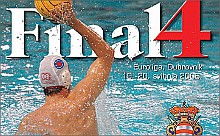
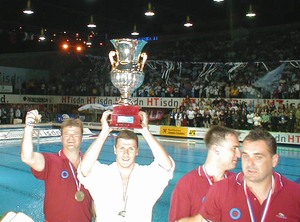
Elvis Fatovic with the trophy of the 2001 European Champions League in water polo
Water polo club Jug from Dubrovnik, founded in 1923, was three times the winner of the Eureopan Champions League: 1980, 2001, 2006, and winner of European Supercup for 2006.
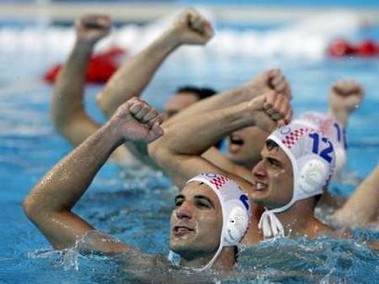
Croatian waterpolo team, led by
their coach Ratko Rudic,
won the title of World
champions in Melbourne, 2007
(source: CROWN)
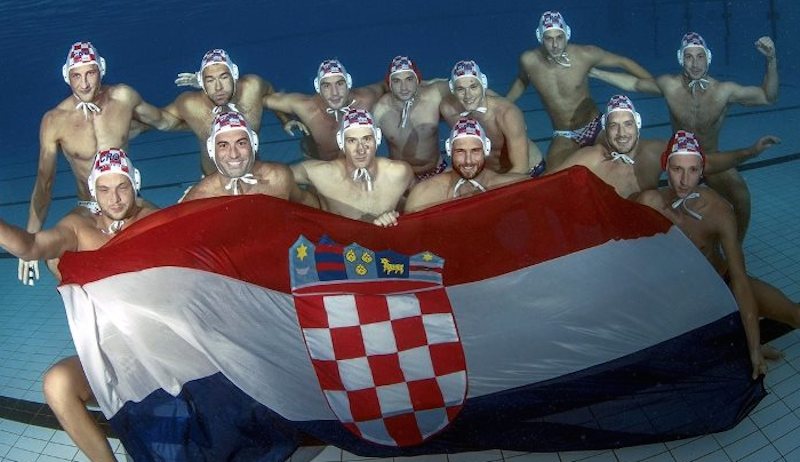
Croatian waterpolo team, led by
their coach Ivica Tucak, won
the title of World
champions for the second time, in Budapest, Hungary, 2017.
Croatian team: Bijač, Marcelić, Macan, Fatović, Lončar, Joković,
Buljubašić, Vukičević, Bušlje, Sukno, Krapić, Šetka, Garcia. We mention
that Xavier Garcia is of Catalonian origin.
Croatia won the prestigeous FINA World Championships waterpolo competition held in Melbourne, 2007, with a perfect score of six consecutive wins. In 2017, they won the same title of FINA World Waterpolo Champions for the second time.
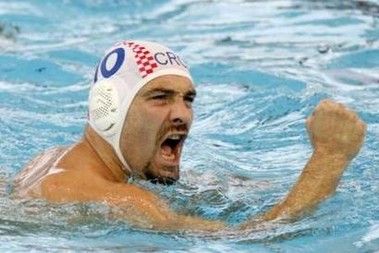
Samir Barac, a member of Croatian waterpolo team winning the title of World champions in Melbourne, 2007 (source: CROWN)
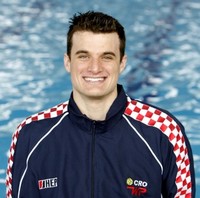
Miho Boskovic, from the City of Dubrovnik, was proclaimed the best European waterpolo player for 2007 by LEN (Ligue Européenne de Natation), ie by the European Swimming League. By the way, Miho is professor of piano, which he studied at the Music Academy in Split. Photo from www.crowaterpolo.com.
Croatia became European waterpolo champion for 2010. The championship has been organized on Croatia's capital Zagreb, and the event was described as the best so far.
Croatian waterpolo team won gold medal at the 2012 Olympica Games in London, winning all the matches.
The Rowing
Club Neptun (Veslacki klub
Neptun) in Dubrovnik
was founded in 1923.
In the school year 1890/1891 the Dubrovnik Grammar School introduced
rowing as
an optional subject within the gymnastics programme and a ten-oar boat
was used
for pupils. Since 2000 the International
Semper Primus Regatta of Student
Eights'(the name is derived
from a Latin proverb: Semper primus, simper melior - Always
the first, always the best). Source Welcome to
Dubrovnik,
2009, no 18, p 27.
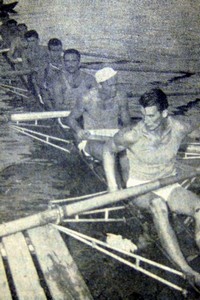
Croatian eight-man boat (on the above photo) won the olympic gold medal at the 1952 Olympic Games in Helsinki. It was the first olympic gold medal in the history of the then state (ex-Yugoslavia). However, the press never reported about this great succes, since all the rowers asked for political asylum after the win and moved to Canada. Members of the team were from the rowing club Gusar from the city of Split. Many thanks to Dr. Ante Chuvalo, Chicago, for this information.
Croatian eight-man boat won the olympic bronze in Sydney in 2000, being only half a boat after the winning GB. This is one of greatest results in the history of Croatian sport in general. The crew, composed of Igor Francetic, Tihomir Frankovic, Tomislav Smoljanovic, Niksa Skelin, Sinisa Skelin, Kresimir Culjak, Igor Boraska, Branimir Ujevic (+ Silvio Petrusko), trained for only four months!
Brothers Skelin (Sinisa and Niksa) won gold medal at the World cup in 2002.
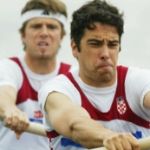
Tomislav Hohnjec won the gold medal of the Wild Water World Championship on the Loishach river in the German Alps in 2004. This was Croatia's first ever gold medal in a C1 wild water championship. In men's C1 team event in Garmish Partenkirchen, 2004, Croatia also won the gold medal, winning over France (silver), Germany (bronze), Czechia and the USA.
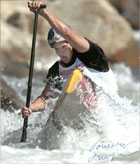
Ivan Kljakovic Gaspic won silver medal at the 2008 Finn European Championship held in La Marina di Scarlino, Maremma, Tuscany, Italy, in 2008. In 2009 he won gold medal in the Finn class at the 41st Semaine Olympique Française in Hyeres.
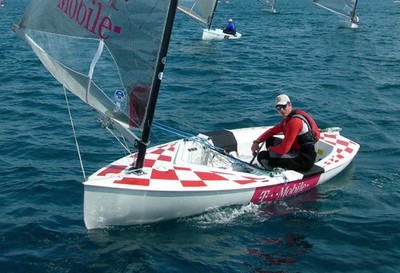
Ivan
Kljakovic Gaspic, Split, Croatia. Photo by Robert Deaves, International
Finn Association. His very nice boat on the photois easily recognizable
by red and silver squares from the Croatian Coat of
Arms.
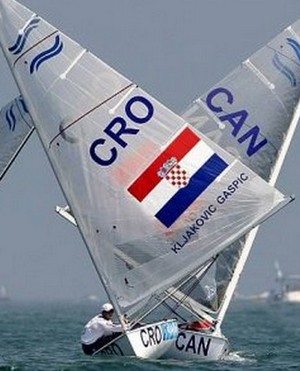
Sime Fantela and Igor Marenic were Men's 470 World Champions at the international sailing competition organized in 2009 in Copenhagen in Denmark. They are both former junior world champions in sailing, members of the Sailing club of St. Krsevan from the city of Zadar, Croatia.
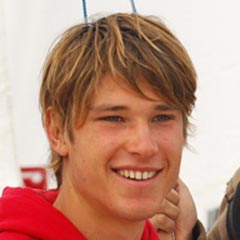 |
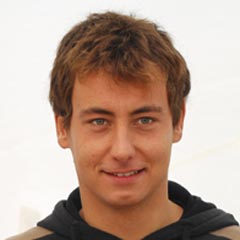 |
Sime and Mihovil Fantela 2018 world championship in sailing in Aarhus Denmark
In 2010 Valent Sinković, Damir Martin, Martin Sinković i David Šain became world champions in Men's Quadruple Sculls competition in New Zealand.
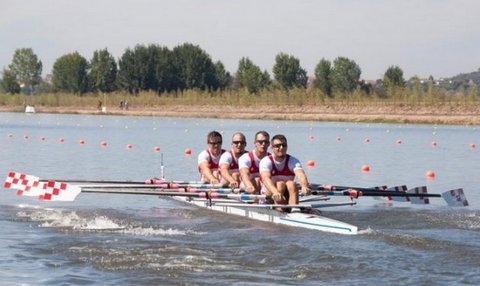
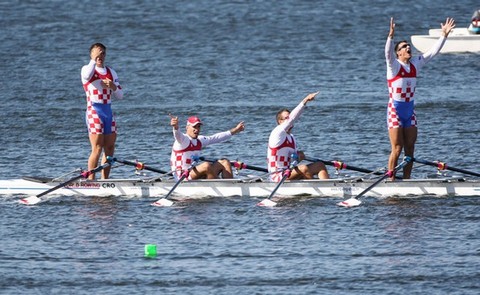
Photo by Sandra
Mu/Getty Images AsiaPac
David Sain, Martin Sinkovic, Damir Martin and Valent Sinkovic of Croatia celebrate winning gold in the Men's Quadruple Sculls Final during day six of the World Rowing Championships at Lake Karapiro on November 5, 2010 in Cambridge, New Zealand.
Sinkovic brothers win gold
medals for Croatia in Double Sculls at 2016 Olympics in Rio
Valent and Martin Sinkovic winning gold medals at European Rowing Championship in Glasgow 2018
Martin and Valent Sinkovic won men's gold medal in Olympic rowing in Tokyo 2021
Croatian single sculls rower Damir Martin won bronze Olympic medal (in his words, of platinum glitter) in Tokyo 2021. This was his third Olympic medal: in London 2012 and in Rio de Janeiro 2016 he won bronze medals.
Martin and Valent Sinkovic won men's gold medal in Olympic rowing in Paris 2024.
Kristijan Curavic set a new world record in diving under ice (2004). He reached a depth of more than 50 meters under ice (1.4 m thick) in Lake Djupvatnet (1100 m above sea level) in the Northeastern part of Norway, wearing only a mask, wetsuit and monofin.
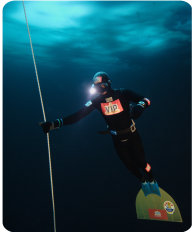
In 2005 he improved his own record reaching an amazing depth of 51.2 m in 1.32 min., at the temperature of air of -22 degrees C, and water temperature of -3 degrees C, while the ice was 2m thick. After this exploit (which is not recognized by international diving organizations due to extreme life danger), Kristijan said: "This is a great event for me and for Croatia". For more information see www.curavic.org.
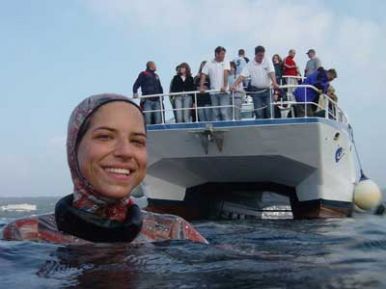
In 2007 Karla Fabrio, a Croatian representative, set up a world record in diving on breath for women (discipline Jump Blue), on the World Championship held in Bari, Italy, attaining 130 m. In this way she equalled her own world record attained earliear the same year in Croatia, on the island of Vis.
Toni Pavicic-Donkic was the first Croat to swim across Gibraltar, 15.5 km, in 2007. It took him 3.09 h, which was the fourth time in history.
Goran Čolak Croatian holder of amazing freediving WR 273 m and of the
Guinness WR 23min breath hold
Valentina Cafolla of Croatia smashes two under-ice freediving records
in 2024.
Toni
Pavicic-Donkic
swimming across La Manche (The English Channel), 36 km, in 2006.
He was the second Croat to swim across La Manche, the first one was Veljko Rogosic.
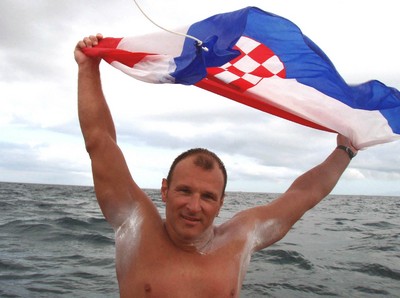
Toni Pavicic-Donkic; photo from www.hsdp.hr; many thanks to Mirko Crncevic for help.
Werner Ilic and Martin Cruickshank two Croatian defenders paddled across the Atlantic in 2022
International Boat Race in Metkovic
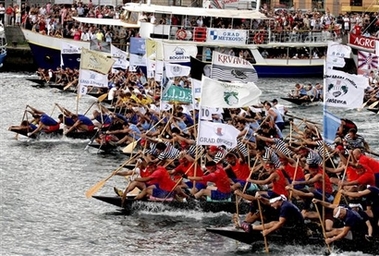
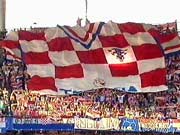
No doubt, the greatest success achieved by Croatian soccer is the third place at 1998 World Championship (Coup du Monde) held in France. The excellent team of Holland was defeated by 2:1 in the match in Paris. Thus Croatian team became the greatest surprise of the Championship. Our national team has been led by Miroslav Ciro Blazevic (Bosnian Croat born in the town of Travnik).

In 2007 Croatian football team led by Slaven Bilic defeated England in London in a qualifying match for Euro 2008, in front of 88,000 spectators. According to English media, it was the greatest display from a visiting nation to Wembley in modern times. Also, it was the first time a country had scored three against England in a competitive game at the venue since 1972. This victory was crucial for Russia to qualify for Euro 2008, see Thank You Croatia! Spasibo Horvatiya!
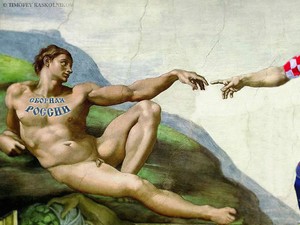
Timofey Raskolnikov, Russia: ...Divine Interference...
The first known traces of tennis playing in Croatia date from 1878 (in Zagreb and Samobor). The first Davis Cup match in Croatia was played in Zagreb in 1927. In the finals of the 1939 Davis Cup match for the European zone, held in Zagreb, the Croatian team defeated the representation of Germany. The players who brought this victory were Franjo Puncec and Dragutin Mitic. This was probably the gratest international success of Croatian sport in the first half of the 20th century. Besides the USA and Australia, by the end of 1930s Croatia had the strongest Davis Cup team in the world. See Povijest tenisa u Hrvatskoj, [PDF].
Dragutin Mitic (1917) was a distinguished Croatian tennis player. In 1938 Simone Mathieu (France) and Mitic became the Roland Garros mixed double champions. In 1939, playing with Franjo Puncec, he defeated the German Davis Cup team at the European zone finals in Zagreb. From 1954 until 1965 he worked as a tennis professional in Bogota, capital of Columbia. It is interesting that his photo appears on a Colombia stamp, see below. In 1965 he immigrated to the USA.
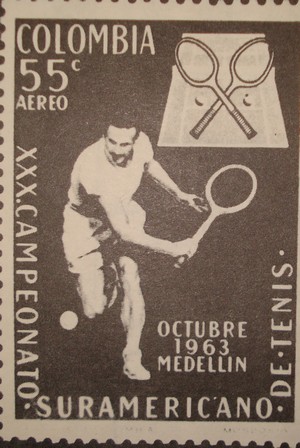
Dragutin Mitic, Croatian tennis
player on a
stamp in Columbia.
Photo of the stamp by Vladimir Novak.
Zeljko Franulovic is one of the greatest players in the history of the Croatian tennis. He was one of the most important personalities in the organizational structure of the ATP (Association of Tennis Professionals). He was the proprietor of the ATP tournament in Geneva, director of the prestigious Masters' tournament in Frankfurt. He prepared an ATP tournament held in Zagreb in 1996, where Goran Ivanisevic triumphed (the same day Iva Majoli triumphed in Tokyo; indeed, a great day for the Croatian tennis).
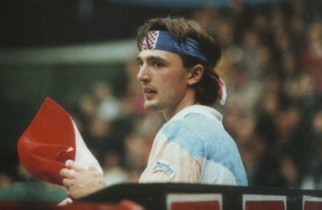
Goran with Croatian coat of arms
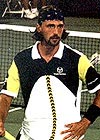
![]()
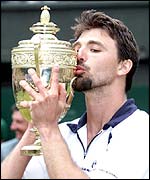
- Goran Ivanisevic (three times Wimbledon finalist, 2001 Wimbledon champion, see some photos from Fotoklub Split)
- Iva Majoli (winner of Roland Garros at the age of 18, Paris, 1997, at that time 4th on the world list)

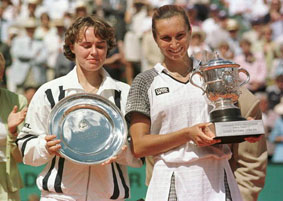
In 2005 Croatia managed to win in the Davis Cup quarter-final match against very strong USA team on "their territory". Ivan Ljubicic (Bosnian Croat born in Banja Luka) defeated Andre Agassi and Andy Roddick, and with his colleague Mario Ancic brought victory against brothers Bryan in the doubles. Until the match with Croatia in 2005 the USA Davis Cup team has never lost a round at home in 105 years of play! Furthermore, Croatia is only 12th country in history to win the Davis Cup.
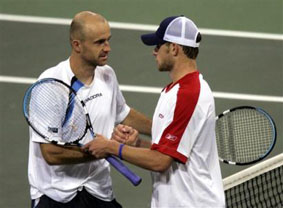
Croatian team won the 2005 Davis Cup in the final match with Slovakia in Bratislava. This is one of the greatest achievements in the history of Croatian sport. Members of the team were
- Ivan Ljubicic,
- Mario Ancic,
- Ivan Karlovic, and
- Goran Ivanisevic.
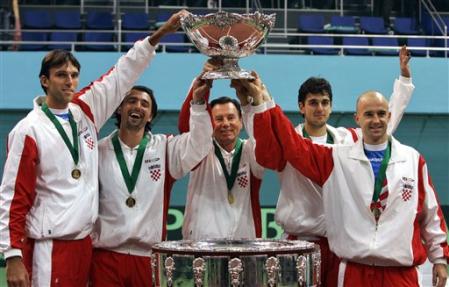
Nikola Pilic, leader of the team, thus became the first captain in the history of Davis cup to win the trophy for different nations (he led Germany to Davis Cup titles in 1988, 1989 and 1993).
Marin
Cilic won the 2005 Roland
Garros gold medal in Paris in the junior category (at the age of 16, as
one of the youngest competitors). He lost only one set in the whole
tournament. Marin was born in the famous Medjugorje
in Bosnia
and Herzegovina. In 2017 he reached the finals of the Wimbledon
tournament, loosing to R. Federer.
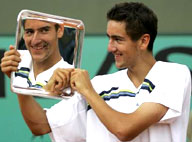
Croatia Open Umag, International tennis championship of Croatia
Croatia winning 2018 Davis Cup against France - in France!Croatia in the world of tennis
Nikola Mektic and Mate Pavic winning gold, Marin Cilic and Ivan Dodig winning
silver in the finals at 2021 Olympic men's tennis doubles final in
Tokyo. Nikola Mektić and Mate Pavić were Wimbledon 2021 champions in the doubles.
Antun Stipancic, often called "the golden left
hand of Croatian sport", was one of the greatest Croatian table tennis
players. In 1965, at the age of 16, he defeated the then European
champion Kjell Johanson by 24:22 in the fifth set, winning Johanson's
two match balls. In men doubles he was gold
medalist during the European Championships organized in Lyon
1968 with Vecko and in Moscow 1970 with Dragutin Šurbek. In 1975 he won the silver medal
at the World Championship in Kolkota in singles and in the doubles -
the gold medal with Dragutin Šurbek
at the World Championship in Pyongyang 1979.
Zoran Primorac won several important international table tennis tournaments: in France in 1997, in Qatar in 1998 and other. The tournaments gathered the best table tennis players of the world.
U borbi za međunarodno priznanje Hrvatskog stolnoteniskog saveza. Zoran Primorac, jedan od najboljih europskih igrača stekao je pravo nastupa na turniru Europa Top 12 za 1991. godinu, ali kako HSTS još nije bio priznat kao samostalni član ITTF-a to je Primorac trebao nastupiti pod jugoslavenskom zastavom, što je odbio. Nakon pregovora između predstavnika HSTS Hudetza i vodstva ETTU postignut je kompromis. U znak solidarnosti svi najbolji europski igrači nastupili su u dresovima bez nacionalnih oznaka, tako da je Primorac mogao nastupiti s dresom bez jugoslavenskog grba i zastave. Izvor.
And Tamara Boros was the best ping-pong player in the world among women of non-Chinese origin for 1998 and 1999 (ranked 13th, the first 12 places being occupied by Chinese players, as well as many places after Tamara). She is famous for her attractive offensive style.
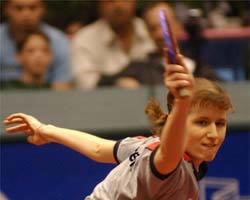
She was the winner of the 2002 TOP 12 European ping-pong competition in Rotterdam. After this success she was placed second (!) on the world rank. She won the third place at the World Championship in Paris in 2003, which is the greatest success of Croatian (and European!) table tennis in history for women.
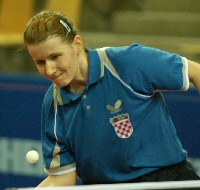
![]()
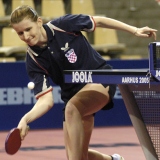
She also won the 2006 Europe TOP 12 competition in Copenhagen.
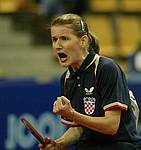
Tamara is the only one in Europe capable to cope with ping-pong players from Asia (China, Japan, etc.). In 2006 she has been invited to China to play table tennis in their professional league, which is the strongest one in the world. In 1991, as a young girl Tamara had to escape with her parents from what is now Serbia and Montenegro, when Greater-Serbian aggression on Croatia started. Her both parents are Hungarians. Together with Janica Kostelic, Tamara Boros is one of the greatest Croatian sportswomen in history.
Sandra Paovic was the 2015 world para-tennis champion of the world and Paraolympic gold medallist in Rio 2016. (An amazing achievement, in view of the dominance of Asian players in ping-pong.)

Anđela Mužinić Vincetić, Europan para-ping-pong champion in Sheffield
2023 (above),
and Olympic para-ping-pong champion in Paris 2024 (below). Photos by
Croatian Paralympic Committee.

Anđela Mužinić Vincetić was the 2024 Olympic para-tennis champion in Paris. In 2023, she became the European para-tennis champion in Sheffield, England. (As in the case of Sandra Paović, this an amazing achievement, in view of the dominance of Asian players in ping-pong.) Hats off to Mirela Šikoronja, a trainer of both players.
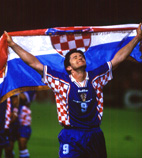
Davor
Šuker, Golden
Boot Winner,
1998 France
Fantastic goals by Davor Šuker
- Davor Suker played soccer for "Sevilla",
- Robert Jarni for "Betis",
- Aco Petrovic (brother of Drazen Petrovic) was a trainer of a basketball club in Sevilla and, last but not least,
- Vjekoslav Sutej conducted the Royal Philharmonic Orchestra in Sevilla from 1990 to 1996 (better known as conductor of annual Christmas concerts in Vienna).
|
In the summer of 2005 a qualifying soccer match between Hungary and Croatia was held in Budapest for the World Competition in 2006, when Croatian team already had secured the first place in their group. Within Croatian fans there was unpleasant disorder, which according to Vlatko Markovic, president of Croatian Soccer Association, has been organized in advance in order to discredit Croatia. Namely, a group of alleged Croatian fans with Croatian design came to the match from a part of Serbia inhabited by Croatians. See his interview to Hrvatska rijec, Subotica, October 2005, No 141, p 57. |
In 2018, Croatian achieved its greatest success in football - silver medal at the FIFA World Cup (orgnaized in the Russian Federation), surpassing the 1998 success of winning bronze medal at the FIFA World Cup (organized in France). We recall the names of Davor Šuker, Zvonimir Boban and Slaven Bilić from 1998, and the names of Luka Modrić, Ivan Rakitić and Dejan Lovren in 2018. See here:
Silver medal of diamond glitter for Croatia at the 2018 FIFA World Cup final with golden FranceCroatia 2 - 1 England at the FIFA World Cup 2018 in
Moscow
Croatia 2 (4) - Russian Federation 2 (3) at the FIFA World Cup 2018
Croatia 1 (3) - 1 (2) Denmark at the FIFA World Cup
2018
Luka Modric of Croatia named UEFA Player of Year for 2018
Luka Modric of Croatia named world's best football player by FIFA for 2018
Croatia winning bronze medal at the 2022 Footaball World Championship in Qatar
Damjan Rodin 1910-1968 Croatian priest in Brasil founder of Vila Croacia in Rio de Janeiro
In addition to this, due to information provided by maestro Frano Kakarigi (distinguished Croatian classical double bassist working in Granada, Spain, born in the city of Dubrovnik), we know of a Croatian football tema wearing Croatian jerseys:
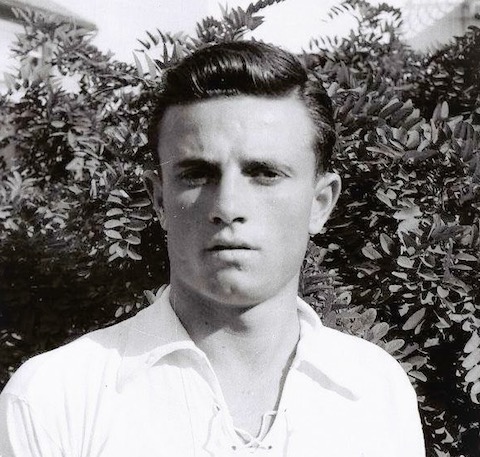
Ante Žanetić, a member of world's best soccer team in 1960,
along with Pele, DiStefano, Puskas etc.
The ex-Yugoslav soccer team won the Olympic gold medal in Rome in 1960. The same year, Croatian soccer player Ante Zanetic (1936-2014), was elected by World Soccer (London) as a member of the world's best eleven, along with Pele, DiStefano, Puskas, Gento, Julinho, etc. Also in 1960, he participated at European championships in Paris, winning silver medal. In 1967, he emigrated to Germany, and died in Australia. In 2006 he wrote an autobiographical book Zlato Rima i Srebro Pariza (The Gold of Rome and Silver of Paris). Jakov Sedlar, distinguished Croatian filmmaker, produced a 30 min biographical film about Ante Zanetic.
Source www.blato.hr
Croatian soccer international matches in 1940 with Switzerland and in 1990 with the USA
The University of Zagreb futsal team represented Croatia at the FISU World University Futsal Championship in China which was held from 10th to 16th June 2024 in Shanghai. After advancing through the group stage, a 4:1 victory was achieved in the quarter-finals against the Portugal team, followed by a 4:2 win against Ukraine in the semi-finals. In the final match against Brazil our boys beat a team full of top international players 4:1 and deservedly became world futsal champions. Watch the final match between Croatia and Brazil.
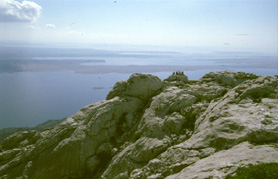 Croatia
is the only country in the world with no mountain above 2,000
meters (though with probably the most beautiful mountain in Europe -
VELEBIT) and with world's top skier - Janica
Kostelic. She was shining in
women's slalom in 1999 (being only 17 years old). Her second victory of
the season put her in first place in the World Cup overall standings
and strengthened her lead in the specialty standings. In her historical
victory in Serre Chevalier, France, 5. December 1999, the difference
between the first two was 1.78 seconds, the greatest achieved in the
previous 20 years! Her ardent supporter is Goran Ivanisevic. In March
2001 Janica became the World
Cup Champion in alpine
skiing. This is one of greatest successes in the history of Croatian
sport. Upon her arrival to the Zagreb airport she obtained 1256 roses
and custard slices...
Croatia
is the only country in the world with no mountain above 2,000
meters (though with probably the most beautiful mountain in Europe -
VELEBIT) and with world's top skier - Janica
Kostelic. She was shining in
women's slalom in 1999 (being only 17 years old). Her second victory of
the season put her in first place in the World Cup overall standings
and strengthened her lead in the specialty standings. In her historical
victory in Serre Chevalier, France, 5. December 1999, the difference
between the first two was 1.78 seconds, the greatest achieved in the
previous 20 years! Her ardent supporter is Goran Ivanisevic. In March
2001 Janica became the World
Cup Champion in alpine
skiing. This is one of greatest successes in the history of Croatian
sport. Upon her arrival to the Zagreb airport she obtained 1256 roses
and custard slices...

In 2002, at the Winter Olympic Games held in Salt Lake City in the USA, Janica Kostelic became the first Alpine skier to win as many as four Olympic medals at a single Game: three gold medals and one silver. This was a result of many years of painstaking work undertaken already at her tender age by her father Mr. Ante Kostelic and the whole family. As stated by Mr. Kostelic, this success would not have been possible without free Croatia.
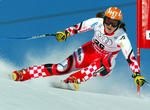
And Janica's brother, Ivica Kostelic, stunned everybody with his win in the 2001 World Cup slalom in Aspen, Colorado, USA, at the age of 22. He skied out of the 64th position in the first run, then was fastest in the second run to win in 1 minute, 38.81 seconds. It was the latest starting position for a slalom winner in World Cup history and third latest in any event. In December 2008 he secured his ninth career win at the Alta Badia slalom in Italy. Ivica is also known as the best blues and rock guitarist among skiers, and at the same time the best skier among blues and rock guitarists.
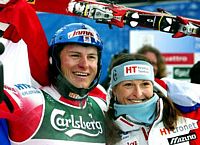
1. Ivica Kostelic, Croatia, 1 minute, 38.81 seconds. 2. Giorgio Rocca, Italy, 1:38.93. 3. Mario Matt, Austria, 1:39.00.
In 2003 Ivica and Janica Kostelic both won the title of world champions in slalom. They became the first siblings to win gold medals in the same event at the world's.
In 2006 Janica won gold medals in combined event at the Olympic games in Torino, Italy, and silver medal in Super-G. With this achievement (four gold medals and two silver on two Olympic Games) she became
- the most successful skier among women in the history of Olympic Games
- the first alpine skier, male or female, to win four medals at one Olympics.
- the first female alpine skier to win six Olympic medals.
Her brother Ivica won silver olympic medal in men's Alpine skiing combined event.
In 2010 Ivica won two silver medals for Croatia at the Winter Olympic Games in Vancouver, Canada, one in slalom and another in combined. In 2011 he won a World Cup slalom race in Adelboden, Switzerland.
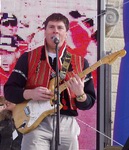
The life of the family of Kostelic is unique in the history of skiing sport (and may be in the history of sport in general). When Janica and Ivica were very young, they used to travel with their old Lada (Russian car), and also to sleep and eat in the car. At the same time other children stayed in a hotel, sleeping in their warm beds. Kostelic's were sleeping also in a small mountain tent, sometimes at the temperature reaching -20 degrees Celsius. They were not able to pay for their trainings, so they used to wake up at 4 o'clock in the morning, to wash their faces with snow, and train at dawn (free of charge) with their worn up gloves, while others were still sleeping or having breakfast.
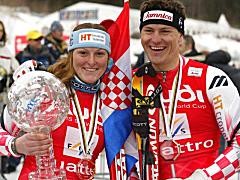
Ivica and Janica at the Olympic games in Salt Lake City,
USA, 2002, photo by Getty ImagesIt is well known that skiing is the sport of the rich. When Kostelic's went back home from Austria, Germany, France or Switzerland, several times it happened to them that they had to sell their skies in order to be able to buy petrol for their Lada... And let us not forget, at that time the Greater Serbian aggression was raging throughout Croatia and Bosnia-Herzegovina (1990-1995). Mr. Ante Kostelic-Gips himself, father of Ivica and Janica, is an amazing Croatian sportsman and trainer, former handball player, working with his children on the long run. He remembers with deep gratitude an Austrian, Mr Willie Arnsteiner, wire-keeper, who donated them 100 Schillings daily during a critical period, and who predicted their great skiing future. At the age of 15 Janica had 22 consecutive wins at European competitions for children during one season. One day after the death of president Franjo Tudjman, Janica was skiing with mourning black armband. Young Kostelic's were raised in deep patriotism, and their sacrifices will always be remembered. Let us also mention a regular short ritual of Christian crossing immediately before every competition. It is amusing to see how "objective" European TV media strive to avoid this indicative and important detail.
Janica with her three olympic gold medals
Salt Lake City, USA, 2002At the very end of 1999 Janica had a tragic fall: four of her ligaments on the knee out of five were broken. After a very difficult operation and reconstruction of her knee, she had a painstaking program of getting back to normal living. She was able not only to walk again, but also to win on European, World, and Olympic competitions in skiing.
The human story of Kostelic's is waiting to be written in all details, with a special emphasis on low blows of "independent" media. This story is much greater than the story about their sport successes. Ivica and Janica, like many others on this web page, would never have appeared without the advent of free Croatia.
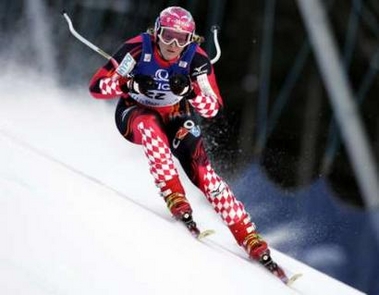
Janica Kostelic,
winning the 2006 Women Alpine Ski World Cup super-G race
in Bad Kleinkircheheim (photo by Ruters/Calle Teornstroem)
Académie des sports, Paris - Le palmarès 2005 ... Janica Kostelic reçoit le Prix International Monique Berlioux 2006 (performance la plus remarquable de l'année écoulée): Janica Kostelic (Croatie - Ski alpin), triple championne du monde de ski alpin.
Janica
with Croatian
coat of arms (AP Photo/A.
Trovati), Sweden, 2006
World
Cup champion for the third
time,
set a
new single-season points record
for women after winning the final Alpine skiing race of the season in
the giant slalom.
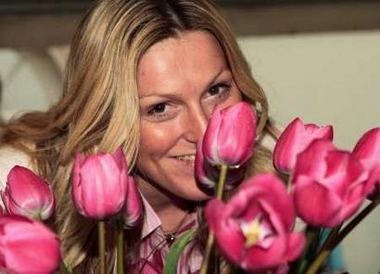
Croatia's alpine skiing champion Janica Kostelic smells a brand new variety of Dutch-grown tulips named after her at a ceremony in Zagreb, 2006. A Dutch tulip grower Cor Grooteman from the town of Lisse, the Netherlands, asked Janica Kostelic for permission to use her name for the new sort of tulips, thus honouring the World Cup winner and Olympic champion. REUTERS/Nikola Solic
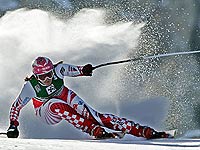
![]()
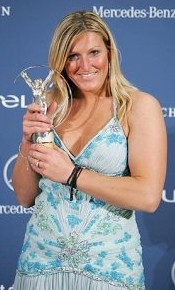
Janica
- winner of the
2006 Laureus
World Sports Award, Barcelona
Photo by Reuters
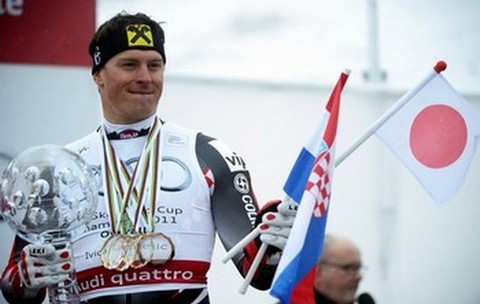
Ivica Kostelic won the World Cup slalom title, the combined World Cup title, and the overall World Cup title in 2011. He poses with a Japanese flag in tribute to the victims of the earthquake and ensuing Tsunami. Photo by Getty Images.
Japanese skier Akira Sasaki had his greatest sports achievement in 2003 on the skis of Ivica Kostelić. Namely, Ivica Kostelić lended him, upon Akira's request, his own pair of skis. On that occasion (World cup men's slalom in Wengen, Switzerland), Akira was placed the 2nd, and Ivica the 3rd.
Ivica Kostelić - Treniral sem trikrat več kot drugi!
Zrinka Ljutić was the winner of the skiing World Cup slalom in Semmering, Austria, for 2024/25.
This was the first Croatian victory since legendary Janica Kostelić in 2006. Ljutic si prende dei rischi enormi,...

Otto Lang (1908-2006) founded the first ski school at Mount Rainier (a National Park in the USA) in 1937 and directed Sun Valley's ski school before and after World War II. Then he launched a successful career as a Hollywood filmmaker. He was born in 1908 in the small village of Zenica, Bosnia, to an Austrian father and Croatian mother. One of his best-known pupils was Gretchen Kunigk of Tacoma, who later won an Olympic gold medal for the United States in 1948 under her married name, Gretchen Fraser. "He was an unbelievable human being," said skiing filmmaker and longtime friend Warren Miller. "He is the last of the old Austrian ski instructors; it is the absolute end of an era." Miller also called Lang a "Renaissance man."
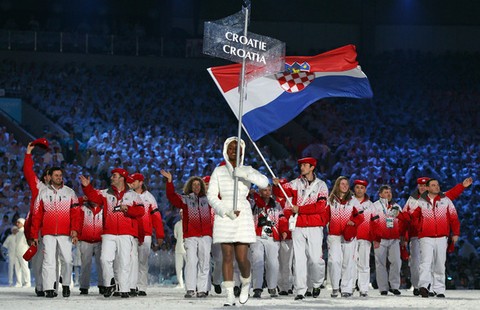
Jakov Fak, biathlon athlet, wearing the Croatian national flag at the
solemn opening of 2010 Winter Olympic Games in Vancouver, Canada.
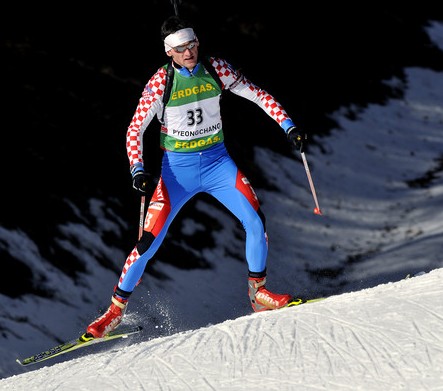
Jakov Fak, biathlon athlet. These two photos by Getty Images.
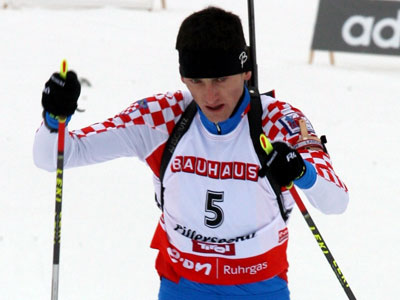
Jakov Fak, Croatia's biathlon skiing athlet, won a bronze medal in the 10 km sprint at the 2010 Winter Olympics Games in Vancouver.
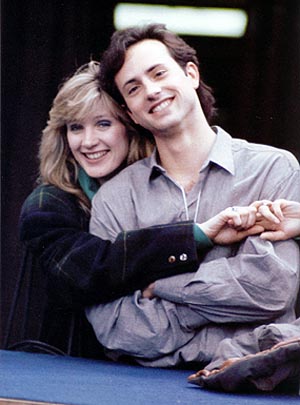
Val and Sandra Bezic, brother and sister, are famous Canadian figure skating pair. They were champions of Canada in the period of 1970-1974, and representatives of Canada in the Winter Olympic Games, Munich, 1972 (placed ninth). Sandra Bezic is known as one of the best figure skating choreographers in the world. For many years, Bezic served as producer, director, and choreographer of the touring show Stars on Ice. Sandra Bezic also worked on highly acclaimed "Carmen on Ice." She designed programs for Olympic champions Brian Boitano and Kristi Yamaguchi, and wrote the book The Passion to Skate, which was made into a documentary. Bezic also choreographed the routines of figure skaters Kurt Browning, Josée Chouinard, and Katarina Witt for 1994 Olympics.
European champion Nikolay Pechalov (of Bulgarian origin) won Croatia's Olympic gold medal in weightlifting in men's 62 kilogram class in Sydney in 2000. He set an Olympic Games record of 150 kg in the snatch and lifted 175 kg in the clean and jerk for a combined total of 325 kg, an Olympic record. His principal sponsor was Goran Ivanisevic.
Dean Lukin is a famous weigthlifter in Australia. He has Croatian roots: his father Dinko Lukin, a famous tuna farmer in Australia, is from Croatia. In 1984, with the assistance of an Eastern European and USSR boycott of the Los Angeles Games, Dean Lukin won Australia's first weightlifting gold medal at an Olympic Games.
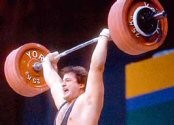
His win was in the Super Heavyweight category (approximatly 140 kg), and in fact he was the first ever in the history of the sport to do so (snatch 172.5 kg, clean & jerk 240 kg, total 412.5 kg). Dean, a full-time tuna fisherman and part-time weightlifter, had the honour to carry the Australian flag during the closing ceremony of the 1984 Olympic Games.
Dean Lukin 1982 Commonwealth Games, YouTube
Dean Lukin jerks 227.5kg 1983,YouTube
1985 Dean Lukin 240.5kg Jerk, YouTube
|
Run Your Best ... One great achievement is to do a "P.B.": personal best. They want to achieve the Olympic motto "Citius--altius--fortius": "Faster, higher, stronger". Whenever an athlete achieves beyond his or her best ever achievement, then you have a success, whether a medal is won or not. One personal best which stands out in my memory, resulted in a gold medal for Dean Lukin in the Los Angles Games 1984. Dean Lukin, from Port Lincoln, South Australia, was an amateur in Olympic weight lifting. He was the son of a fisherman who worked for his dad. He built massive legs and arms hauling in huge blue fin tuna from the southern ocean. He was 24, already a millionaire, owning a white Mercedes and two light planes. He won gold in the super-heavyweight division in the Commonwealth Games and the national titles. He trained only in the 16 weeks prior to the Olympics because work came first. The super heavyweight lifters from Russia, the Eastern block countries and America trained full-time, held all the records, and had won every previous Olympic gold medal. At Los Angles Dean Lukin was to lift his personal best.
After the first round he trailed in third place behind the American Mario Martinez who was the favourite and Manfred Nerlinger from West Germany. Dean Lukin, after the snatch was 15 kilos behind Mario allowing for the personal weight difference. In the final clean and jerk Mario lifted 220 kilograms, his personal best. But Lukin with a great effort lifted 222 kilograms. The West German tried for his personal best but fell flat on his back. Then Lukin lifted 227.5 kilos, his personal best. Lukin was now guaranteed at least a silver medal. Mario then lifted another personal best of 225 kilos. 10,000 American spectators roared, certain their man had won the gold medal. Mario Martinez came back on stage for three encores. Lukin was, on the combined weights 12.5 kilos behind, and he had just lifted his personal best for the second time. The speakers announced "Dean Lukin will pass other lifts and go for gold. He has ordered the bar to be loaded to 240 kilos." The crowd was stunned. As he walked on stage, Lukin was attempting 12.5 kilos more than he had ever lifted before. With the cleanest of clean and jerks he heaved the bar above his head, holding aloft the equivalent of two large refrigerators! The judges signalled a clean lift. He had won. The crowd went delirious. I jumped high into the air! That night the Russians took him out to dinner, treating him like a hero because he had defeated the Americans. He had done his best. ... The point of personal best, is not an individual achievement. Dean Lukin had his coach by his side focusing his energies. His mother was in the dressing room urging him on in a way that made him determined. A personal best is a quality that is achieved by human effort plus the help and support of others. ... Dr John F. MacArthur, Jr. "The Gospel According To Jesus" Zondervan, 1988. [source] |
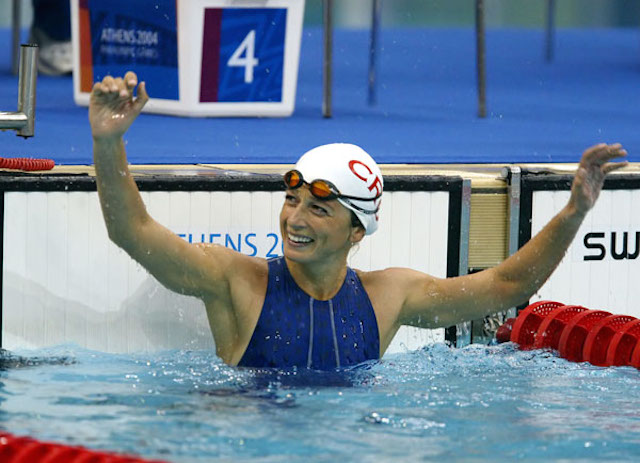
Ana Srsen, photo from Hrvatski paraolimpijski odbor
Ana
Srsen is a top Croatian
paraolympic swimmer, very successfuly competing at interanational
competitions for disabled. In 1998 she became a world
record holder
on 100 m breast-stroke. In 2002 she set two
world records
at Interantional Competition in Zagreb: on 200 m and on 800 m
freestyle. Interview with Ana Srsen (in Croatian).
Mihovil Spanja, Manchester 2008, source javno.com
Mihovil Spanja, a top paraolympic swimmer, set a world record on 50 m breast-stroke for disabled in Berlin in 2008. At the 2008 Paraolympic World Cup in Manchester he won silver medal on 100 m backstroke.
During the 2010 World Championship in the Netherlands 2010 Mihovil Spanja won paralympic gold medal on 400 m freestyle in large pools with a new world record 4:47.39, and another gold medal on on 100 m breastroke, again with a new world record 1:25.11. At the same competition he won silver medal on 100 m backstroke, and another silver medal on 200 m mixed style with a new European record 2:37.32.
Croatian Sports Federation For The Disabled
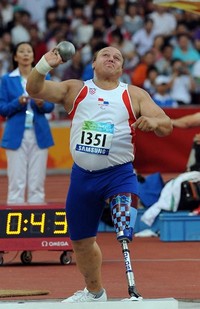 |
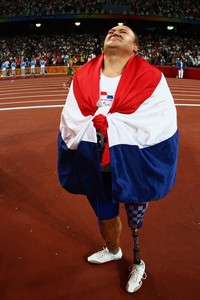 |
Darko Kralj won gold medal at the 2008 Beijing Paraolympic Games in China. Competing in Men's Shot Put he broke a new world record at the National Stadium known as Bird's Nest. He said: "My biggest wish was to listen to the Croatian anthem in Beijing." Mr. Kralj lost his left leg during the Serbian aggression on Croatia. Photos by Xinhua.
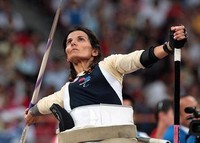 |
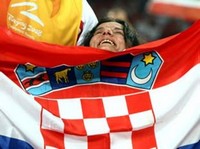 |
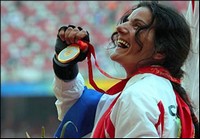 |
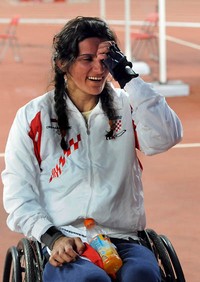 |
Antonia Balek won two gold medals for Croatia at the 2008 Paraolympic Games in China. The first gold medal has been won in women's javelin, and the second in women's Shot Put, both with new world records. The competition was held in the National Stadium known as Bird's Nest in front of 85,000 spectators. Antonia survived a deep coma which lasted for 3 years. Photos by Getty Images.
Mikela Ristoski is Paraolympic
champion in triple long jump in Rio 2016, as well as the 2015 world champion in para-triple long
jump..
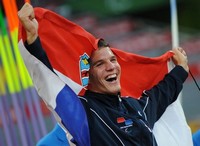 |
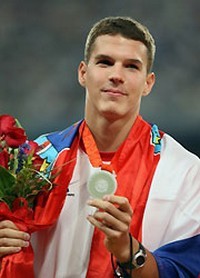 |
Branimir Budetic celebrates with his mother after finishing second during the final of the men's javelin F11-12 classification event at the 2008 Beijing Paralympic Games in Beijing on September 10, 2008. Photos by Getty Images.
Since 1998. Croatia had outstanding results in crossbow competitions, especially for ladies. One of the best competitors of the world for ladies is Branka Pereglin. She was:
- eight times European champion: in 1995 (Portugal), 1997 (Portugal), 1999 (Croatia), 2001 (Czechia), 2005 (Holland), 2007 (Russia) at outdoor competitions, and in 2003 (Belgium) and 2005 (Russia) at indoor competitions on 18 meters,
- from 1995 to 2007 she participated on all European championships, and won gold medals on all of them!
- four times world champion: in 1996 (Taiwan), 1998 (Hungary), 2002 (Croatia), in 2004 (Czechia), and world vicechampion of the world in 2000 (New Zealand) and 2006 (Austria). She set seventeen (17) world records, and equalled one.
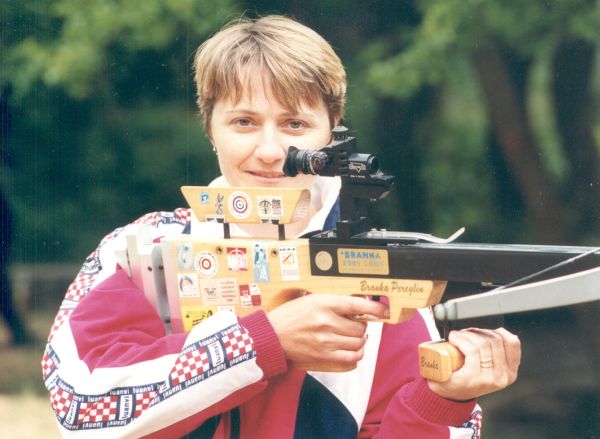
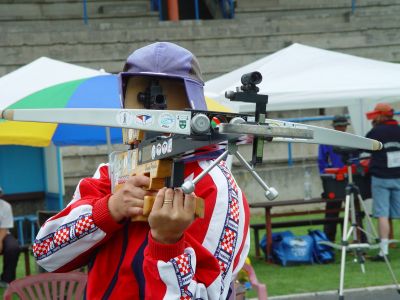
Branka
Pereglin, a famous Croatian
crossbow shooter, in total concentration...
Note her nice dress decorated with well known motive from Croatian Coat of Arms.
It is amazing that in 2004, during the European Crossbow Championship in Czechia, the Croatian female team (Branka Pereglin, Nikolina Krivanek and Sanja Komar) surpassed the best male team (France) by 85 points!
Croatia had excellent results in shooting sport, mainly due to shooting club Dalmacijacement in the town of Solin near Split. Among numerous excellent resuts we mention Branka Jankov who won gold medal at the 1983 European shooting championship in Dortmund, for which she was awarded as Olympic flame carrier for the Winter Olympics in Sarajevo in 1984. In 1986 Vesna Domazet became world champion st the World shooting championship in Suhl, the then Eastern Germany, and in 1987 she won gold medal at the World Cup in Munich. Ana Nazor and Marina Borzic won gold medals at the European junior shooting championship in 1994 in Wroclaw, Poland. The same year Mladenka Malenica won gold medal at the World Cup in Milano.
Many thanks to dr. Josipa-Pina Milisic for help to collect data about the Solin shooting club.
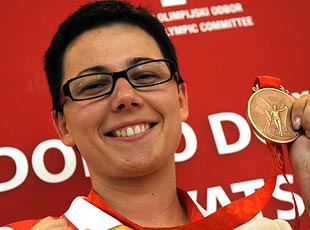
Snjezana Pejcic won bronze medal at the 2008 Bejing Olympic Games in women's shooting (10m air rifle, 40 shots).
Josip Glasnovic wins Croatia's first gold of the 2016
Olympics (in trap shooting)
 The
Croatian alpinist Stipe
Bozic (Split) climbed Mount
Everest twice, the first time in 1979. He was the second European to do
so after Messner. See Bozic's beautiful photos at Fotoklub Split.
The Croatian Alpine
Association
(Hrvatski planinarski savez) is among the oldest in the world: it was
founded in 1874, the same year as in France. Let us mention by the way
that the
oldest novel in the world about mountains
is Planine
(Mountains), written in Croatian by Petar
Zoranic in 1536 and printed in
Venice in 1569. It is also the
oldest Croatian novel. Petar
Zoranic, outstanding Croatian Renaissance writer, was born in Zadar in
1508.
The
Croatian alpinist Stipe
Bozic (Split) climbed Mount
Everest twice, the first time in 1979. He was the second European to do
so after Messner. See Bozic's beautiful photos at Fotoklub Split.
The Croatian Alpine
Association
(Hrvatski planinarski savez) is among the oldest in the world: it was
founded in 1874, the same year as in France. Let us mention by the way
that the
oldest novel in the world about mountains
is Planine
(Mountains), written in Croatian by Petar
Zoranic in 1536 and printed in
Venice in 1569. It is also the
oldest Croatian novel. Petar
Zoranic, outstanding Croatian Renaissance writer, was born in Zadar in
1508.

Four Croatian female alpinists climbed on Mt Everest (8850 m) in 2009, among them two sisters Darija and Iris Bostjancic, besides Milena Šijan and Ena Vrbek. It was for the first time that two sisters climbed on the top of Himalayas.
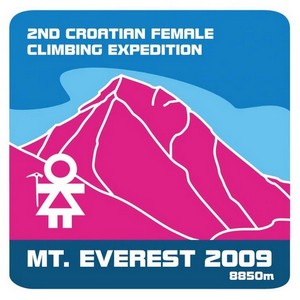
It was the 2nd Female Croatian Expedition, led by Darko Berljak, which consisted of 11 girls. The first expedition was successfuly organized in 2007 on Cho Oyu (8201 m), 35 km west of Mt Everest.
Ivan Bjelovucic the first in history to fly over
the Alps in 1913
Blanka Vlasic, high-jumper, with her record jump of 2.07 (the second best in history, 2007), was Junior World Champion twice (Santiago, Chile, in 2000; Kingston, Jamaica, in 2002), and champion of XIVth Mediterranean Games in Tunisia, 2001. In 2007 she won the gold medal in Japan at the World Championship in Athletics, Osaka 2007. This is the first gold medal for Croatia in World Championships in Athletics, and one of the greatest successes in the history of Croatian sport. In 2008, at the Bejing Olympic Games, Blanka had another great international success: she won silver medal. Before that she had as many as 34 consecutive wins at international competitions in the course of 14 months.
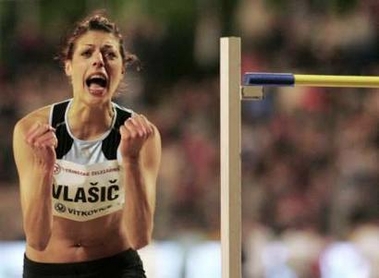
At the Golden Spike IAAF World Athletics Tour Meeting in Ostrava, Czech Republic, Branka Vlasic won with a jump of 2.00 meters (photo by REUTERS/David W. Cerny).
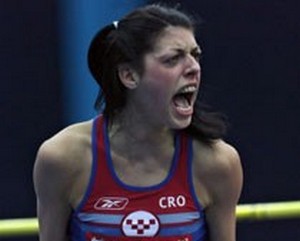
Winner of the 2007 Atheltic tournament in Shanghai
Blanka Vlasic in Gothenburg,
Sweden (Getty
Images)
World Championship in Athletics, Osaka 2007. Endelig lyktes det for kroatiske Blanca Vlasic i et mesterskap. I Osaka ble hun dronningen av hoyde.
Blanka Vlasic celebrating her
victory with
Croatian flag in her hands,
at the World Championship in Athletics, Osaka 2007, source CROWN
Click on the photo to see the movie (source docteur-es-sport.fr, France):
...
avec commentaire en français (cliquer sur l'image)
Blanka Vlasic, la nouvelle reine du
saut en hauteur, Osaka 2007
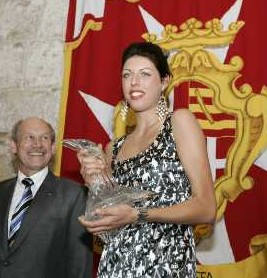
World High Jump champion Blanka Vlasic of Croatia with her trophy after receiving the Waterford Crystal European Female Athlete of the Year Award for 2007 (on the left the President of European Athletics, Hansjorg Wirz) during a gala dinner at the Mediterranean Conference Centre in Valletta, Malta, October 12, 2007. Photo by Reuters.
Blanka Vlasic won the title of the champion of the world in Berlin 2009 for the second time after Osaka 2007. In 2009 she reached the height of 208 cm at the Hanzekovic Memorial Athelic Competition in Croatia's capital Zagreb, which was the second best result in the history of high jumping for women.
In 2010 in Doha, capital of Dakar, Blanka Vlasic won her fourth consecutive gold medal at World Cahmpionships, as the first female competitor in history.
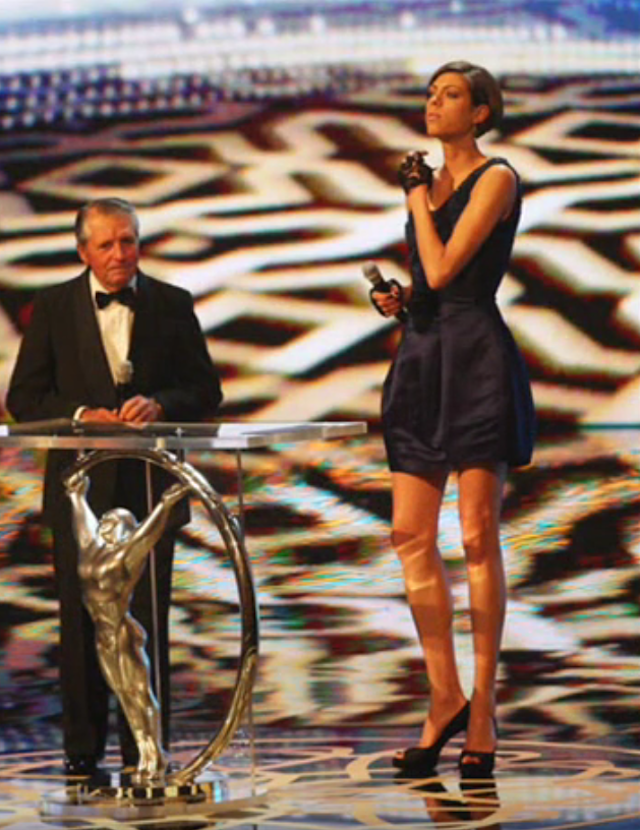
Blanka Vlasic was proclaimed the best female athlete in the world for 2010.
Sandra Perkovic,
discus
thrower, was only at the age of 19
when she won
gold medal at the European
Athletics Championships
Barcelona 2010. She became the youngest
ever winner of discus throw competition among woman. In 2012,
during the Summer Olympic Games in London, she won Olympic women's discus title
with a Croatian
national record throw of 69.11m, in front of girls from Russia and
China. In the
2012 European Championships in Helsinki she won gold medal.
In 2013 she becam
the world
champion in
discus throw, during the World Attheltics Championship in Moscow.
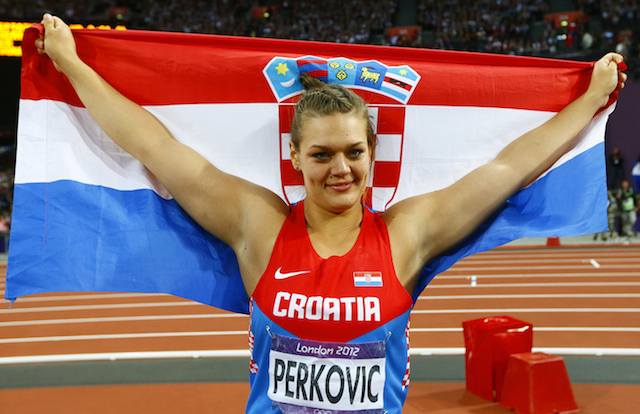
In 2014 she won the title of European champion in discus throwing in Zurich, Switzerland, in 2014. It was her THIRD consecutive title of European champion, and this fact is unique for this sport. Her winning throw was more than 71 meters. Three of her other attempts at the competition would also have sufficed for the gold medal. The winner of the silver medal representing France had more than 5m weaker result, which shows the dominance of Sandra Perković in this sport. This is one of the greatest achievements in the history of Croatian sports.
Croatia won record 6 medals at the 2012 Olympic games in London, among them 3 golds:
- Sandra Perković won gold medal in discus throwing,
- Giovanni Cernogoraz won gold medal in trap, and
- Croatian waterpolo team won gold medal, winning all the matches.
Martin Markovic became the second Croatian male athlete to win a world junior title (2014) and the first one in 12 years with a world-junior-leading 66.94m in the discus final at Hayward Field. It was his first global medal after four appearances in World Youth and World Junior Championships finals. Markovic’s gold was Croatia’s second medal in Eugene after Sara Kolak took the silver in the javelin.
Croatian quad scull won silver medal, Lucija Zaninović won bronze medal in tae-kwon-do, handball team also won bronze medal. An unofficial gold medal went to Antonija Mišura, see why.
Filip Ude won silver medal in pommel horse at the 2008 Olympic Games in Beijing. It was the first gymnastics medal for Croatia on Olympic Games.
Jana Koščak won the U20 heptathlon gold medal in Lima at the World Athletics U20 Championships Lima 2024
World Athletics. Interview (in English, by Hannah England); interview (in Croatian, by Dubravko Šimenc), both in 2023.
Tin Srbic won silver medal for Croatia in gymnastics horzontal bar in Tokyo 2021.

Tin Srbić. Photo by Croatian Olympic Committee.
Tin SRBIC (Croatia) - 2023 Artistic European Champion, high
bar, in Antalya (Turkey). Interviews in
English and in Croatian.

In 2025, again in Antalya, Tin Srbić became World Champion (high bar) at Gymnastics World Cup, 2025.

Tin Srbić of Croatia winning the gold medal in gymnastics, high bar, Antalya Wolrd Cup, 2025.
2025 Antalya World Cup High Bar Medal Ceremony.
This is one of the greatest achievements in the history of Croatian sports.
Sofía
Mulánovich Aljovín
(Sofia Mulanovich) is a Peruvian surfer of Croatian descent. She is the
first Peruvian
surfer ever to win an Association of Surfing Professionals World Championship
Tour event. In 2007 she was inducted into the Surfers Hall of Fame, and
in 2009 into the Olympic Museum in Laussane in Switzerland.
Sara Kolak of Croatia wins gold in javelin throw at the 2016
Olympic Games in Rio
Ana Zaninović was the World taekwondo champion in 2011. Two twin sinsters Ana and Lucija Zaninović were European taekwondo champions for 2014 in Baku, Azerbaijan. Young Matea Jelić and Ivana Babić were the World junior taekwondo champions in Taiwan in 2014. Ana Lenard was European karate champion for 2014 in Tampere in Finland.
Sveto Dekovic is distinguished Croatian sportsman (karate, judo, jiu jitsu) of international reputation (European Kyokushin karate champion 2001), living in Tivat in Boka kotorska, Montenegro.
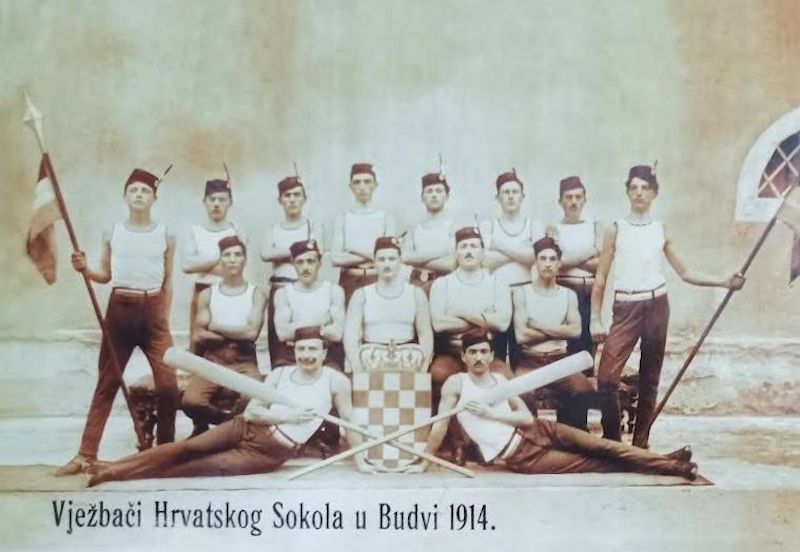
"Croatian Falcon" sports club in Budva (Boka kotorska), 1914
H O R S E S
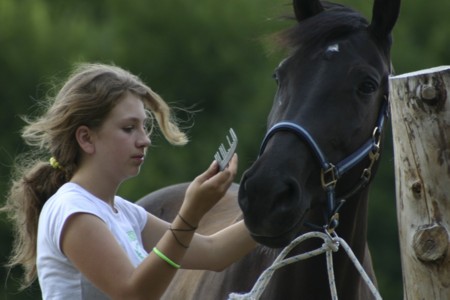
Lucija in the village of
Potkonje near
Knin, at Hrvoje Pozar stud.
Photo by her mother Julija Vojkovic (on this web with kind permission)
Sinjska alka (The Sinj Alka) is a competition to the memory of the legendary 1715 victory over the Turks, where the town of Sinj near Split has been saved. According to the legend, the victory was attained due to the help of the Lady of Sinj (Gospa Sinjska). The aim of the competition, organized August 15th each year since 1715, is to pierce the ALKA with a spear, riding a horse at full speed (45 km/h). The alka is hanged on the rope at the hight of 3,22 m.
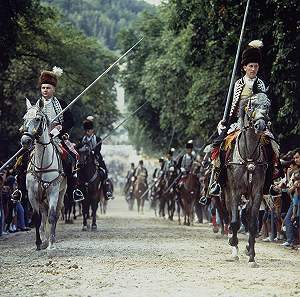
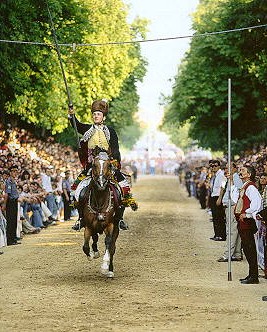

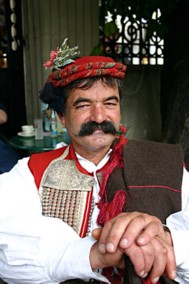
Photo by Julija Vojkovic (on this web with her kind permission)
Horses are very popular in various parts of Croatia, especially in the north (in Slavonia). The Djakovo stud existed already in 1506, and is among the oldest in Europe. It was visited by Queen Elisabeth II, Prince Philip, and Princess Margaret in 1972.
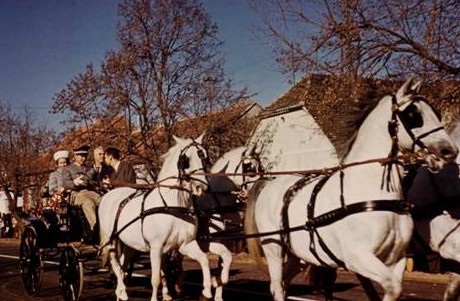
Queen Elisabeth II, Prince
Philip, and
Princess Margaret in Djakovo, Croatia, in 1972.
Photos from CROWN
The town of Djakovo was occupied by the Turks in the period of 1536-1667, and the stud was renewed in 1706. In 1806 it was moved to the nearby Ivandvor, where it is also today.
Also very famous were the Lipik Lipizzaners, which was the largest stud in Croatia until the Greater Serbian 1991-1995 aggression on Croatia.
More about horses... Mr Tony Santic (tuna farmer), Australian Croat born on the beautiful Croatian island of Lastovo, is the owner of a famous mare Makybe Diva. This strange name is an acronym, derived from the names of five ladies employed at Mr Santic: Maureen, Kylie, Belinda, Diane and Vanessa. In 2005 Makybe Diva became the first horse in Australasian racing history to claim three Melbourne Cups and a Cox Plate.
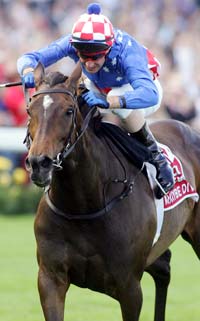
Makybe Diva and Glen Boss with
a Croatian
cap
Photo by Sebastian Costanzo
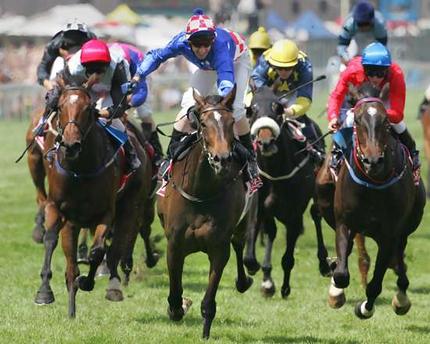
The Boss with Croatian Coat of Arms
and Makybe Diva
Photo by Wayne Taylor
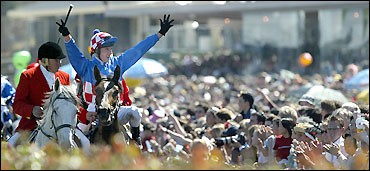
Celebrating the victory
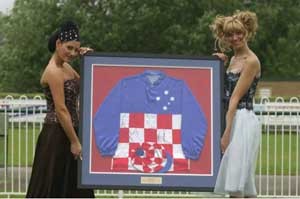
The winning jersey winning the hearts...
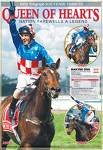
...and media
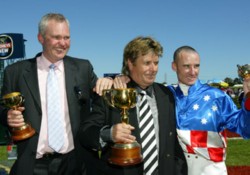
Mr. Tony Santic is in the
middle, Glen Boss
on the right (Makybe
Diva missing),
with Croatian
Coat of Arms on his jersey

Goooooooogling with Makybe Diva and with a Croatian hat ...
Forg Jumping Competition organized annualy by the Museum of Frogs in the village of Lokve, Croatia.
The first mention of playing chess in Croatia dates from 14th century, more precisely, from 1385 in the city of Zadar. Thomas Hyde, an English orientalist from 17th century, travelled through Croatia, and mentioned that the correspondence chess had been played between Croatian and Venetian merchants in 1650, more precisely, beween the Dubrovnik and Venetian merchants. It is the oldest mention of the correspondence chess in history. This fact can be found in his book "De ludis orientalibus" (On Eastern Games), published in Latin in 1694.
In Croatia there are 162 registered players of correspondence chess (30 of them active). Until the advent of computers, chess moves were sent by snail mail, and sometimes one had to wait for a few months for a single move. It is not surprising that such a game could last for several years. Since 1990s the speed of the correspondence chess has been revolutionarized due to the possibilities of electronic communication, and its duration is comparable to that of the "usual" chess game. Information by the courtesy of dr. Zvonko Krecak, Croatian physicist, who is the president of the Croatian Correspondence Chess Association (Hrvatska udruga dopisnog saha) since 1987 (continuously till 2010 when these lines are written).
Ognjen Cvitan, Croatian chess grandmaster, earned the International Master title by winning the 1981 World Junior Championship for competitors under the age of 20.
In Croatia there is a Chess Street, the only one in the world. Aleksandar Lysenko, Russian international chess master, is the author of an article "In the Chess Street" published by the well known Russian chess journal "64 Chess Survey", Moscow 1996. The article deals with the Chess Club in the Chess Street in the town of Ravna Gora in Croatia. He wrote: "It is good that such a street exists, but it is a pity that the street is not in Russia."
Valentina Golubenko and Ivan
Šaric won the titles
of world
youth chess champions for
2008 in the category up to 18 years, at the competition organized in
Vietnam. With two gold medals and one bronze, Croatia was ranked third
at the World Competition, after India and Vietnam, and before China,
Russia, USA, Germany etc.
|
|
We feel it necessary to mention Gari Kasparov, a famous Russian chess player, the former champion of the world. He played as a member of chess teams of Vukovar (in exile from 1991 to 1998) and Sarajevo. Upon his request, Gari Kasparov has been granted Croatian citizenship in February 2014.
Croatia has no tradition in hockey. However, one of the greatest hockey players of today is Joe Sakic, Canadian Croat. His both parents are from Croatia (his father is from Imotski, and mother from Lika). Joe contributed greatly to the final victory of Canadian national team at the 2002 Winter Olympic Games held in Salt Lake City.
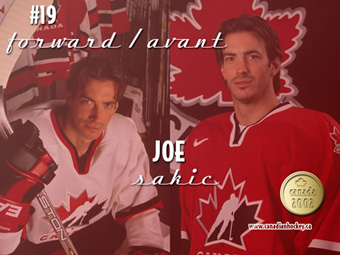
The leader of very important team responsible for computer support of Olympic Games is Boris Sakac, Zagreb, Croatia, in the course of many years, starting from Moscow Olympic Games held in 1980, till Athens in 2004.
Bill Belichick & Nick Saban, two Croatians - Coaches in the NFL (National Football League, USA), are very successful with their teams playing american football. Let us cite Bill Belichick: "...I think it just makes this division, which is already very tough, even that much tougher. You know, two Croatians in the division, Joe, that's not something you see everyday. [Laughter]..." (from an interview given to Joe Benigno and Sid Rosenberg WFAN, sports Radio 66AM New York, January 5, 2005).

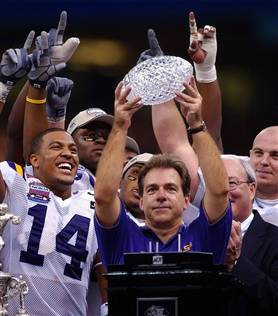
Articles by Vedran Joseph Nazor, Croatian Chronicle, USA:
- Bill Belichick (Bilicic), 3 time super bowl coach
- Croatian Nick Saban, Coach of the Year – Led LSU to NCAA Football Championship
- David Diehl, #66 New York Giants
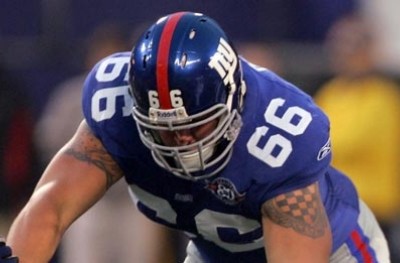
David Diehl, New York Giants, 2008, with Croatian Coat of Arms; photo from CROWN
David Diehl Super Bowl winner in 2012, pride of Croatia and Croatians around the world
Charles Billich is outstanding Croatian painter born in Lovran in Istria, and since 1956 working in Australia. He is Honorary Citizen of Atlanta, Centennial Olympic City, USA, since 1996. Billich was the official artist of the Australian Formula 1 Grand Prix Melbourne in 1996. In 1997 he was designated the official artist of the Australian and French Olympic teams for Olympic Games in Sydney in 2000.
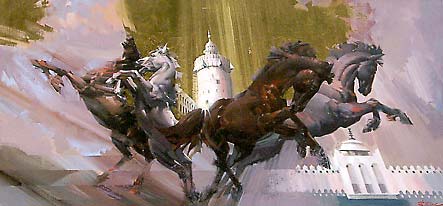
Charles
Billich
Bing
Mah Yong Show
at
American
Sports Art Museum
- Australian Olympic Committee Headquarters, Sydney
- International Olympic Museum, Lausanne, Switzerland
- Selengor Turf Club Equestrian and Sports Center, Kuala Lumpur, Malaysia
- United States Sports Academy
- QinShiHuang BingMa Yong Museum, X'ian, China
In 2004, the China International Culture Exchange Center (CICEC) in Beijing appointed Mr. Ante Glibota, Croatian historian of art and architecture, for a fiveyear term as Foreign Counselor for International Cultural Exchanges. Since 2010 he serves as Vice-President and Curator-in-Chief of the Museum of Art and Urbanity in Shanghai, China. He was appointed curator and editor of “Art and Sport”, an exhibition organized by Adidas and the International Olympic Committee for the Olympic Games 2008 in Beijing, China.
Tajana Raukar: GRACEFUL
PREDATORS
(world
champion medallist in Ice
carving)
World Championship Alaska 2003
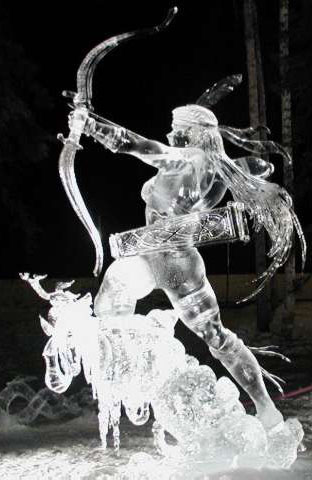
In 1331, the first golf-club in Croatia has been founded in the city of Zagreb. The same year (June 12th, 1931), the first golf tournament in Croatia has been organized in the beuatiful Maksimir Park in Zagreb. The patron of the tournament was Queen Mary of the United Kingdom, who was also present at the tournament.
Source Zvonimir Milčec: Galantni Zagreb, Mladost Zagreb 1989. (2nd edition), p. 237.
Anton Baričević (1925-2003, with the second name also written as Barichievich), was a professional wrestler and a man of incredible power, a frequent guest of the USA media (appearing with Pierre Trudeau, Liza Minnelli, Lee Majors, Sophia Loren, Johnny Carson, Frank Sinatr, Mohammad Ali, Michael Jackson, and even with Mother Theresa), born in Veli Lošinj on the island of Lošinj in Croatia.
It is little known that Diego Maradona, Argentinean soccer player, had a great-grandmother which was a Dalmatian Croat. One of his daughters bears the unique name - Dalma! I owe this information to the King of Dolls.
Tomas Felipe "Trinche"
Carlovich, of Croatian origin, is considered to be one of the
greatest Argentinean football players. More information: info1,
info2, info3,
info4.
Jovica Kozlica
from the city of Split was paper wings world
champion
in Salzburg 2009 in long distance throw reaching 54.43 metres.
Croats at the Olympics, by Adam Eterovich, USA
Croatia - an overview of its History, Culture and Science
